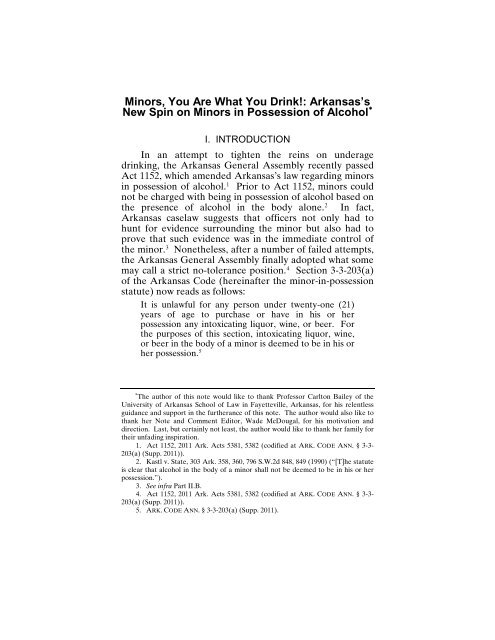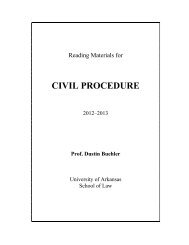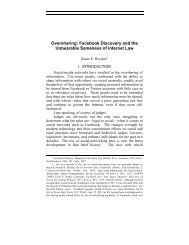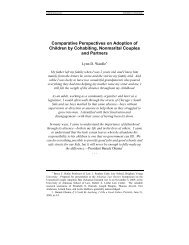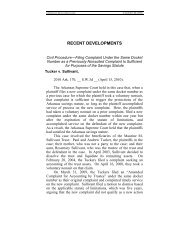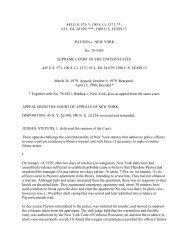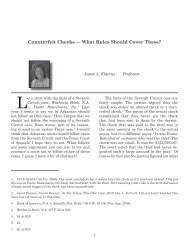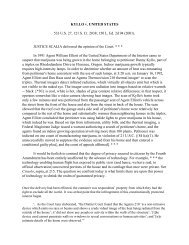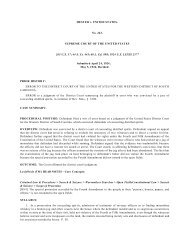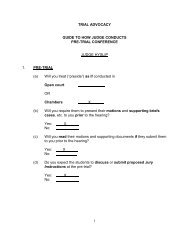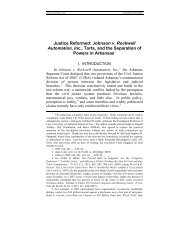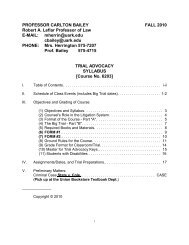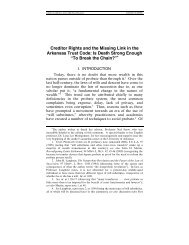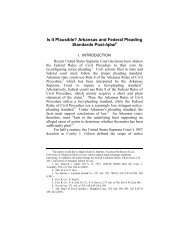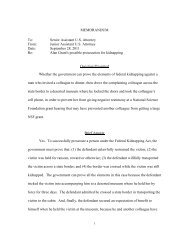Minors, You Are What You Drink!: Arkansas's New Spin on Minors in ...
Minors, You Are What You Drink!: Arkansas's New Spin on Minors in ...
Minors, You Are What You Drink!: Arkansas's New Spin on Minors in ...
Create successful ePaper yourself
Turn your PDF publications into a flip-book with our unique Google optimized e-Paper software.
<str<strong>on</strong>g>M<strong>in</strong>ors</str<strong>on</strong>g>, <str<strong>on</strong>g>You</str<strong>on</strong>g> <str<strong>on</strong>g>Are</str<strong>on</strong>g> <str<strong>on</strong>g>What</str<strong>on</strong>g> <str<strong>on</strong>g>You</str<strong>on</strong>g> <str<strong>on</strong>g>Dr<strong>in</strong>k</str<strong>on</strong>g>!: Arkansas’s<br />
<str<strong>on</strong>g>New</str<strong>on</strong>g> <str<strong>on</strong>g>Sp<strong>in</strong></str<strong>on</strong>g> <strong>on</strong> <str<strong>on</strong>g>M<strong>in</strong>ors</str<strong>on</strong>g> <strong>in</strong> Possessi<strong>on</strong> of Alcohol ∗<br />
I. INTRODUCTION<br />
In an attempt to tighten the re<strong>in</strong>s <strong>on</strong> underage<br />
dr<strong>in</strong>k<strong>in</strong>g, the Arkansas General Assembly recently passed<br />
Act 1152, which amended Arkansas’s law regard<strong>in</strong>g m<strong>in</strong>ors<br />
<strong>in</strong> possessi<strong>on</strong> of alcohol. 1 Prior to Act 1152, m<strong>in</strong>ors could<br />
not be charged with be<strong>in</strong>g <strong>in</strong> possessi<strong>on</strong> of alcohol based <strong>on</strong><br />
the presence of alcohol <strong>in</strong> the body al<strong>on</strong>e. 2 In fact,<br />
Arkansas caselaw suggests that officers not <strong>on</strong>ly had to<br />
hunt for evidence surround<strong>in</strong>g the m<strong>in</strong>or but also had to<br />
prove that such evidence was <strong>in</strong> the immediate c<strong>on</strong>trol of<br />
the m<strong>in</strong>or. 3 N<strong>on</strong>etheless, after a number of failed attempts,<br />
the Arkansas General Assembly f<strong>in</strong>ally adopted what some<br />
may call a strict no-tolerance positi<strong>on</strong>. 4 Secti<strong>on</strong> 3-3-203(a)<br />
of the Arkansas Code (here<strong>in</strong>after the m<strong>in</strong>or-<strong>in</strong>-possessi<strong>on</strong><br />
statute) now reads as follows:<br />
It is unlawful for any pers<strong>on</strong> under twenty-<strong>on</strong>e (21)<br />
years of age to purchase or have <strong>in</strong> his or her<br />
possessi<strong>on</strong> any <strong>in</strong>toxicat<strong>in</strong>g liquor, w<strong>in</strong>e, or beer. For<br />
the purposes of this secti<strong>on</strong>, <strong>in</strong>toxicat<strong>in</strong>g liquor, w<strong>in</strong>e,<br />
or beer <strong>in</strong> the body of a m<strong>in</strong>or is deemed to be <strong>in</strong> his or<br />
her possessi<strong>on</strong>. 5<br />
∗ The author of this note would like to thank Professor Carlt<strong>on</strong> Bailey of the<br />
University of Arkansas School of Law <strong>in</strong> Fayetteville, Arkansas, for his relentless<br />
guidance and support <strong>in</strong> the furtherance of this note. The author would also like to<br />
thank her Note and Comment Editor, Wade McDougal, for his motivati<strong>on</strong> and<br />
directi<strong>on</strong>. Last, but certa<strong>in</strong>ly not least, the author would like to thank her family for<br />
their unfad<strong>in</strong>g <strong>in</strong>spirati<strong>on</strong>.<br />
1. Act 1152, 2011 Ark. Acts 5381, 5382 (codified at ARK. CODE ANN. § 3-3-<br />
203(a) (Supp. 2011)).<br />
2. Kastl v. State, 303 Ark. 358, 360, 796 S.W.2d 848, 849 (1990) (“[T]he statute<br />
is clear that alcohol <strong>in</strong> the body of a m<strong>in</strong>or shall not be deemed to be <strong>in</strong> his or her<br />
possessi<strong>on</strong>.”).<br />
3. See <strong>in</strong>fra Part II.B.<br />
4. Act 1152, 2011 Ark. Acts 5381, 5382 (codified at ARK. CODE ANN. § 3-3-<br />
203(a) (Supp. 2011)).<br />
5. ARK. CODE ANN. § 3-3-203(a) (Supp. 2011).
978 ARKANSAS LAW REVIEW [Vol. 65:977<br />
Arkansas is not the <strong>on</strong>ly state that has enacted<br />
<strong>in</strong>ternal-possessi<strong>on</strong> legislati<strong>on</strong> permitt<strong>in</strong>g the presence of<br />
alcohol <strong>in</strong> the body to c<strong>on</strong>stitute possessi<strong>on</strong>. Recently,<br />
several states passed laws prohibit<strong>in</strong>g what is comm<strong>on</strong>ly<br />
referred to as <strong>in</strong>ternal possessi<strong>on</strong> of alcohol by a m<strong>in</strong>or. 6<br />
The Alcohol Policy Informati<strong>on</strong> System, an <strong>on</strong>l<strong>in</strong>e resource<br />
run by the Nati<strong>on</strong>al Institute of Health, def<strong>in</strong>es <strong>in</strong>ternal<br />
possessi<strong>on</strong> as the presence of alcohol <strong>in</strong> a m<strong>in</strong>or’s system as<br />
determ<strong>in</strong>ed by a blood, ur<strong>in</strong>e, or breath test. 7<br />
Arkansas’s adopti<strong>on</strong> of Act 1152 seems to be <strong>in</strong><br />
resp<strong>on</strong>se to the difficulty police officers historically faced <strong>in</strong><br />
prov<strong>in</strong>g actual or c<strong>on</strong>structive possessi<strong>on</strong>. 8 Some Arkansas<br />
police officers c<strong>on</strong>tend that this new statute will help crack<br />
down <strong>on</strong> underage dr<strong>in</strong>k<strong>in</strong>g. 9 For example, prior to Act<br />
1152, m<strong>in</strong>ors would dr<strong>in</strong>k and make sure not to walk<br />
around with alcohol <strong>in</strong> their hands. 10 One police officer<br />
stated, “They’ll take a dr<strong>in</strong>k and they’ll set it down and<br />
walk away.” 11 Before Act 1152, Arkansas caselaw<br />
dem<strong>on</strong>strated that c<strong>on</strong>vict<strong>in</strong>g a m<strong>in</strong>or of be<strong>in</strong>g <strong>in</strong> possessi<strong>on</strong><br />
of alcohol required the state to prove that the m<strong>in</strong>or was<br />
either <strong>in</strong> actual or c<strong>on</strong>structive possessi<strong>on</strong> of the alcohol. 12<br />
If a court had evidence of alcohol present <strong>in</strong> the m<strong>in</strong>or’s<br />
body, the evidence would <strong>on</strong>ly be c<strong>on</strong>sidered circumstantial<br />
and could not c<strong>on</strong>stitute possessi<strong>on</strong> per se. 13<br />
6. See <strong>in</strong>fra note 102; see also Nat’l Inst. of Health, Nat’l Inst. <strong>on</strong> Alcohol<br />
Abuse and Alcoholism, Underage <str<strong>on</strong>g>Dr<strong>in</strong>k</str<strong>on</strong>g><strong>in</strong>g: Possessi<strong>on</strong>/C<strong>on</strong>sumpti<strong>on</strong>/Internal<br />
Possessi<strong>on</strong> of Alcohol, ALCOHOL POLICY INFO. SYS.,<br />
http://www.alcoholpolicy.niaaa.nih.gov/Underage_Possessi<strong>on</strong>_C<strong>on</strong>sumpti<strong>on</strong>_Interna<br />
l_Possessi<strong>on</strong>_of_Alcohol.html (last updated Jan. 1, 2011) [here<strong>in</strong>after Underage<br />
<str<strong>on</strong>g>Dr<strong>in</strong>k</str<strong>on</strong>g><strong>in</strong>g] (list<strong>in</strong>g Colorado, Kansas, Michigan, Missouri, <str<strong>on</strong>g>New</str<strong>on</strong>g> Hampshire, North<br />
Carol<strong>in</strong>a, South Carol<strong>in</strong>a, and Wyom<strong>in</strong>g as states that prohibit <strong>in</strong>ternal possessi<strong>on</strong>).<br />
7. Underage <str<strong>on</strong>g>Dr<strong>in</strong>k</str<strong>on</strong>g><strong>in</strong>g, supra note 6.<br />
8. The parameters of actual and c<strong>on</strong>structive possessi<strong>on</strong> are def<strong>in</strong>ed <strong>in</strong> Part<br />
II.A.<br />
9. Sara Forhetz, <str<strong>on</strong>g>New</str<strong>on</strong>g> Arkansas Law Cracks Down <strong>on</strong> Underage <str<strong>on</strong>g>Dr<strong>in</strong>k</str<strong>on</strong>g><strong>in</strong>g:<br />
Stricter Penalties for <str<strong>on</strong>g>M<strong>in</strong>ors</str<strong>on</strong>g> <strong>in</strong> Possessi<strong>on</strong>, KY3 (May 5, 2011),<br />
http://articles.ky3.com/2011-05-05/underage-dr<strong>in</strong>k<strong>in</strong>g_29514974.<br />
10. Id.<br />
11. Id.<br />
12. See, e.g., D.C. v. State, No. CA 94-316, 1995 WL 107297, at *2 (Ark. Ct.<br />
App. Mar. 8, 1995) (cit<strong>in</strong>g Kastl v. State, 303 Ark. 358, 360, 796 S.W.2d 848, 849<br />
(1990)).<br />
13. See DeShields v. State, No. CA 03-1243, 2004 WL 2239403, at *2 (Ark. Ct.<br />
App. Oct. 6, 2004).
2012] MINORS, YOU ARE WHAT YOU DRINK! 979<br />
Accord<strong>in</strong>g to the new language of Arkansas’s m<strong>in</strong>or<strong>in</strong>-possessi<strong>on</strong><br />
statute, the def<strong>in</strong>iti<strong>on</strong> of possessi<strong>on</strong> has<br />
expanded and has taken <strong>on</strong> a mean<strong>in</strong>g different from the<br />
general usage of the term. Webster’s Dicti<strong>on</strong>ary def<strong>in</strong>es<br />
possessi<strong>on</strong> as “the act of hav<strong>in</strong>g or tak<strong>in</strong>g <strong>in</strong>to c<strong>on</strong>trol.” 14<br />
This def<strong>in</strong>iti<strong>on</strong> <strong>in</strong>dicates that whether a pers<strong>on</strong> has or takes<br />
c<strong>on</strong>trol of a particular th<strong>in</strong>g determ<strong>in</strong>es <strong>on</strong>e’s possessi<strong>on</strong> of<br />
it. Whether this idea of c<strong>on</strong>trol is captured by the amended<br />
language of the statute is unclear. In essence, Act 1152<br />
suggests that all a police officer would have to do <strong>in</strong> order<br />
to charge a m<strong>in</strong>or with be<strong>in</strong>g <strong>in</strong> possessi<strong>on</strong> is show evidence<br />
that alcohol was <strong>in</strong> the m<strong>in</strong>or’s body at the time of arrest.<br />
Such evidence does not seem to require a show<strong>in</strong>g of<br />
c<strong>on</strong>trol. In additi<strong>on</strong>, the language of Act 1152 is unclear as<br />
to whether an officer would need additi<strong>on</strong>al evidence to<br />
prove the m<strong>in</strong>or had knowledge of c<strong>on</strong>sumpti<strong>on</strong>. With the<br />
new, expanded def<strong>in</strong>iti<strong>on</strong> of possessi<strong>on</strong>, Arkansas<br />
presumably hopes to successfully combat underage<br />
dr<strong>in</strong>k<strong>in</strong>g by mak<strong>in</strong>g possessi<strong>on</strong> easier for law enforcement<br />
officials to prove. Act 1152 may, however, produce<br />
un<strong>in</strong>tended c<strong>on</strong>sequences that are more vex<strong>in</strong>g than the<br />
orig<strong>in</strong>al c<strong>on</strong>cerns under the old law.<br />
The purpose of this note is to shed light <strong>on</strong> some of the<br />
issues that may arise as a result of Act 1152. Part II<br />
explores the historical development of possessi<strong>on</strong> laws <strong>in</strong><br />
general and ends with a more particularized summary of<br />
the development of m<strong>in</strong>or-<strong>in</strong>-possessi<strong>on</strong> laws. This porti<strong>on</strong><br />
of the note <strong>in</strong>cludes a discussi<strong>on</strong> of how Arkansas courts<br />
have def<strong>in</strong>ed possessi<strong>on</strong> <strong>in</strong> general and how courts have<br />
dealt with possessi<strong>on</strong> of alcohol by m<strong>in</strong>ors before Act 1152.<br />
Part III discusses the discrepancy that exists am<strong>on</strong>g<br />
jurisdicti<strong>on</strong>s regard<strong>in</strong>g the possessi<strong>on</strong> versus c<strong>on</strong>sumpti<strong>on</strong><br />
dist<strong>in</strong>cti<strong>on</strong>. Part IV provides a brief summary of two states<br />
that have decl<strong>in</strong>ed to adopt <strong>in</strong>ternal-possessi<strong>on</strong> laws and<br />
discusses the reas<strong>on</strong>s beh<strong>in</strong>d their decisi<strong>on</strong>s. 15 F<strong>in</strong>ally, Part<br />
14. Possessi<strong>on</strong> Def<strong>in</strong>iti<strong>on</strong>, MERRIAM-WEBSTER ONLINE DICTIONARY,<br />
http://www.merriam-webster.com/dicti<strong>on</strong>ary/possessi<strong>on</strong> (last visited Sept. 24, 2012).<br />
15. This Part illustrates that some state courts appear to oppose the <strong>in</strong>ternalpossessi<strong>on</strong><br />
pr<strong>in</strong>ciple because it attempts to expand the term “possessi<strong>on</strong>” bey<strong>on</strong>d its<br />
comm<strong>on</strong>-sense def<strong>in</strong>iti<strong>on</strong>, it does not provide clarity as to whether knowledge of
980 ARKANSAS LAW REVIEW [Vol. 65:977<br />
V compares Arkansas’s m<strong>in</strong>or-<strong>in</strong>-possessi<strong>on</strong> statute with<br />
<strong>in</strong>ternal-possessi<strong>on</strong> statutes of other states. This<br />
comparis<strong>on</strong> exam<strong>in</strong>es why Arkansas’s statute needs to be<br />
further <strong>in</strong>terpreted and clarified. For example, Arkansas’s<br />
statute does not provide any guidance to an officer <strong>on</strong> how<br />
to obta<strong>in</strong> evidence of alcohol <strong>in</strong> the body. 16 In additi<strong>on</strong>,<br />
unlike similar statutes <strong>in</strong> other states, Arkansas’s m<strong>in</strong>or-<strong>in</strong>possessi<strong>on</strong><br />
statute does not c<strong>on</strong>template any excepti<strong>on</strong>s,<br />
nor does it provide any <strong>in</strong>dicati<strong>on</strong> as to how to account for<br />
knowledge of <strong>in</strong>gesti<strong>on</strong>. 17 Part V ends with a brief analysis<br />
of how a recent United States Supreme Court decisi<strong>on</strong><br />
affects the def<strong>in</strong>iti<strong>on</strong> of custody with regard to m<strong>in</strong>ors, and<br />
how an officer’s adm<strong>in</strong>istrati<strong>on</strong> of a breath or blood test<br />
might require a Miranda warn<strong>in</strong>g depend<strong>in</strong>g <strong>on</strong> the m<strong>in</strong>or’s<br />
age. This decisi<strong>on</strong> might make th<strong>in</strong>gs more problematic for<br />
officers <strong>in</strong> deal<strong>in</strong>g with a m<strong>in</strong>or <strong>in</strong> possessi<strong>on</strong>.<br />
II. DEFINING POSSESSION: A BRIEF HISTORICAL<br />
DEVELOPMENT<br />
The first problem aris<strong>in</strong>g from Arkansas’s amended<br />
m<strong>in</strong>or-<strong>in</strong>-possessi<strong>on</strong> statute c<strong>on</strong>cerns the development and<br />
expansi<strong>on</strong> of possessi<strong>on</strong> laws. Over the years, possessi<strong>on</strong><br />
laws have become a pragmatic means of support<strong>in</strong>g the war<br />
<strong>on</strong> drugs. 18 Establish<strong>in</strong>g the possessi<strong>on</strong> of certa<strong>in</strong><br />
substances as a crime made law enforcement very efficient<br />
because, essentially, “possessi<strong>on</strong> is easier to prove than use,<br />
distributi<strong>on</strong>, or sale.” 19 N<strong>on</strong>etheless, despite the fact that<br />
possessi<strong>on</strong> laws make it easier to combat drug use and<br />
distributi<strong>on</strong>, how <strong>on</strong>e def<strong>in</strong>es possessi<strong>on</strong> under these<br />
circumstances has proven difficult. In look<strong>in</strong>g at the<br />
various statutes and court decisi<strong>on</strong>s that have dealt with the<br />
term, <strong>on</strong>e can easily c<strong>on</strong>clude that “[possessi<strong>on</strong>] rema<strong>in</strong>s<br />
c<strong>on</strong>sumpti<strong>on</strong> is required, and it does not provide any c<strong>on</strong>siderati<strong>on</strong> of whether the<br />
act of c<strong>on</strong>sumpti<strong>on</strong> has to occur with<strong>in</strong> a state’s jurisdicti<strong>on</strong>.<br />
16. ARK. CODE ANN. § 3-3-203(a) (Supp. 2011).<br />
17. ARK. CODE ANN. § 3-3-203(a).<br />
18. D<strong>on</strong>ald T. Campbell, Case Comment, Crim<strong>in</strong>al Law—Catch Me with a<br />
Can: North Dakota’s M<strong>in</strong>or <strong>in</strong> Possessi<strong>on</strong> of Alcohol Statute Requires Proof of<br />
“Actual” Possessi<strong>on</strong>, 70 N.D. L. REV. 1059, 1060 (1994).<br />
19. Id. (<strong>in</strong>ternal quotati<strong>on</strong>s omitted).
2012] MINORS, YOU ARE WHAT YOU DRINK! 981<br />
<strong>on</strong>e of the most elusive and ambiguous of legal<br />
c<strong>on</strong>structs.” 20<br />
A. Possessi<strong>on</strong> <strong>in</strong> Other Jurisdicti<strong>on</strong>s<br />
Traditi<strong>on</strong>ally, the term possessi<strong>on</strong> was more prevalent<br />
<strong>in</strong> circumstances <strong>in</strong>volv<strong>in</strong>g property law. 21 One of the first<br />
references to possessi<strong>on</strong> <strong>in</strong> the c<strong>on</strong>text of crim<strong>in</strong>al law<br />
occurred <strong>in</strong> larceny cases. 22 Larceny is def<strong>in</strong>ed as “[t]he<br />
unlawful tak<strong>in</strong>g and carry<strong>in</strong>g away of some<strong>on</strong>e else’s<br />
pers<strong>on</strong>al property with the <strong>in</strong>tent to deprive the possessor<br />
of it permanently.” 23 The c<strong>on</strong>sensus <strong>in</strong> larceny cases is that<br />
possessi<strong>on</strong> of stolen property <strong>on</strong>ly occurs if a pers<strong>on</strong> is <strong>in</strong><br />
exclusive c<strong>on</strong>trol of the property. 24 In State v. Castor, the<br />
Supreme Court of Missouri specifically stated that<br />
possessi<strong>on</strong> <strong>in</strong> larceny cases must be “recent, unexpla<strong>in</strong>ed,<br />
and exclusive.” 25 The court reas<strong>on</strong>ed that c<strong>on</strong>structive<br />
possessi<strong>on</strong>, like c<strong>on</strong>structive knowledge, might be sufficient<br />
to establish civil liability but not crim<strong>in</strong>al liability. 26 The<br />
court further expla<strong>in</strong>ed that possessi<strong>on</strong> <strong>in</strong> a crim<strong>in</strong>al case<br />
would require c<strong>on</strong>siderati<strong>on</strong> of whether the possessi<strong>on</strong> was<br />
20. Id. (alterati<strong>on</strong> <strong>in</strong> orig<strong>in</strong>al) (quot<strong>in</strong>g Charles H. Whitebread & R<strong>on</strong>ald<br />
Stevens, C<strong>on</strong>structive Possessi<strong>on</strong> <strong>in</strong> Narcotics Cases: To Have and Have Not, 58 VA.<br />
L. REV. 751, 751 (1972)).<br />
21. Charles H. Whitebread & R<strong>on</strong>ald Stevens, C<strong>on</strong>structive Possessi<strong>on</strong> <strong>in</strong><br />
Narcotics Cases: To Have and Have Not, 58 VA. L. REV. 751, 751 (1972).<br />
22. Id. at 754.<br />
23. BLACK’S LAW DICTIONARY 959 (9th ed. 2009).<br />
24. See People v. Hurley, 60 Cal. 74, 77 (1882) (“The possessi<strong>on</strong> must be<br />
exclusive. A f<strong>in</strong>d<strong>in</strong>g of stolen property <strong>in</strong> the pris<strong>on</strong>er’s house or apartment, is<br />
equally competent <strong>in</strong> evidence aga<strong>in</strong>st him, as a f<strong>in</strong>d<strong>in</strong>g up<strong>on</strong> his pers<strong>on</strong>. But the<br />
house or room must be proved to be <strong>in</strong> his exclusive occupati<strong>on</strong>.”); Van Straaten v.<br />
People, 56 P. 905, 906 (Colo. 1899) (“[P]ossessi<strong>on</strong> must be pers<strong>on</strong>al and exclusive,<br />
recent and unexpla<strong>in</strong>ed . . . .”); State v. Raym<strong>on</strong>d, 46 C<strong>on</strong>n. 345, 348 (1878) (stat<strong>in</strong>g<br />
that the alleged stolen property must be found <strong>in</strong> the exclusive possessi<strong>on</strong> of the<br />
pris<strong>on</strong>er <strong>in</strong> order to c<strong>on</strong>vict for larceny); State v. Wright, 66 A. 364, 365 (Del. 1907)<br />
(stat<strong>in</strong>g that larceny <strong>on</strong>ly occurs when it is proven that the accused had exclusive,<br />
recent, and unexpla<strong>in</strong>ed possessi<strong>on</strong> of the property); Robers<strong>on</strong> v. State, 24 So. 474,<br />
479 (Fla. 1898) (not<strong>in</strong>g that a c<strong>on</strong>victi<strong>on</strong> for larceny requires proof of exclusive<br />
possessi<strong>on</strong>); Watts v. People, 68 N.E. 563, 567 (Ill. 1903) (stat<strong>in</strong>g that stolen property<br />
must be exclusive <strong>in</strong> the defendant for a larceny c<strong>on</strong>victi<strong>on</strong>); State v. Stutches, 144<br />
N.W. 597, 599 (Iowa 1913) (stat<strong>in</strong>g that possessi<strong>on</strong> must be exclusive for larceny<br />
c<strong>on</strong>victi<strong>on</strong>s).<br />
25. 5 S.W. 906, 909 (Mo. 1887).<br />
26. Id.
982 ARKANSAS LAW REVIEW [Vol. 65:977<br />
actual and known to the defendant. 27 Apply<strong>in</strong>g this same<br />
reas<strong>on</strong><strong>in</strong>g, <strong>in</strong> Tyler v. Comm<strong>on</strong>wealth, the Virg<strong>in</strong>ia<br />
Supreme Court ruled aga<strong>in</strong>st the c<strong>on</strong>cept of c<strong>on</strong>structive<br />
possessi<strong>on</strong> hold<strong>in</strong>g that a pers<strong>on</strong> “can <strong>on</strong>ly be required to<br />
account for the possessi<strong>on</strong> of th<strong>in</strong>gs which he actually and<br />
know<strong>in</strong>gly possessed, as, for example, where they are found<br />
up<strong>on</strong> his pers<strong>on</strong>, or <strong>in</strong> his private apartment, or <strong>in</strong> a place of<br />
which he kept the key.” 28<br />
In resp<strong>on</strong>se to the cultural mores of the 1920s, the need<br />
for an expanded def<strong>in</strong>iti<strong>on</strong> of possessi<strong>on</strong> became apparent<br />
dur<strong>in</strong>g the Prohibiti<strong>on</strong> Era. 29 For example, <strong>in</strong> State v.<br />
Parent, an employee of a hotel was c<strong>on</strong>victed of the illegal<br />
possessi<strong>on</strong> of alcohol al<strong>on</strong>g with his employer. 30 Although<br />
the employee argued that six other employees were <strong>on</strong> shift<br />
that night and all had access to the alcohol <strong>in</strong> the pantry,<br />
the court stated that the term possessi<strong>on</strong> <strong>in</strong>cluded the act of<br />
“hav<strong>in</strong>g a th<strong>in</strong>g <strong>in</strong> <strong>on</strong>e’s power.” 31 This def<strong>in</strong>iti<strong>on</strong> meant<br />
that <strong>on</strong>e was <strong>in</strong> possessi<strong>on</strong> if that pers<strong>on</strong> could exert<br />
<strong>in</strong>fluence over a th<strong>in</strong>g regardless of whether that pers<strong>on</strong><br />
actually did. 32 Similarly, <strong>in</strong> State v. Spillman, two<br />
defendants were found <strong>in</strong> possessi<strong>on</strong> of <strong>in</strong>toxicat<strong>in</strong>g liquors<br />
when they were walk<strong>in</strong>g toward the liquor and were the<br />
<strong>on</strong>ly <strong>on</strong>es <strong>in</strong> the vic<strong>in</strong>ity. 33 The two defendants were<br />
arrested with<strong>in</strong> a half of a block from where the alcohol was<br />
found. 34 The court stated that <strong>on</strong>e could be <strong>in</strong> possessi<strong>on</strong><br />
without actually hav<strong>in</strong>g the items <strong>on</strong> <strong>on</strong>e’s pers<strong>on</strong>. 35<br />
Courts also used this expanded <strong>in</strong>terpretati<strong>on</strong> of<br />
possessi<strong>on</strong> laws when deal<strong>in</strong>g with narcotics cases. In a<br />
California case, People v. S<strong>in</strong>clair, the defendant was<br />
c<strong>on</strong>victed of possessi<strong>on</strong> although the police never observed<br />
the drugs <strong>in</strong> the defendant’s physical c<strong>on</strong>trol. 36 In this case,<br />
27. Id.<br />
28. 91 S.E. 171, 172 (Va. 1917).<br />
29. George H. S<strong>in</strong>ger, C<strong>on</strong>structive Possessi<strong>on</strong> of C<strong>on</strong>trolled Substances: A<br />
North Dakota Look at a Nati<strong>on</strong>wide Problem, 68 N.D. L. REV. 981, 986 (1992).<br />
30. 212 P. 1061, 1061 (Wash. 1923).<br />
31. Id. at 1061-62.<br />
32. S<strong>in</strong>ger, supra note 29, at 987-88.<br />
33. 188 P. 915, 916-17 (Wash. 1920).<br />
34. Id. at 916.<br />
35. Id. at 917.<br />
36. 19 P.2d 23, 24 (Cal. Dist. Ct. App. 1933).
2012] MINORS, YOU ARE WHAT YOU DRINK! 983<br />
the defendant, while driv<strong>in</strong>g his car and be<strong>in</strong>g followed by<br />
the police, ordered another occupant <strong>in</strong> the car to throw the<br />
drugs out the w<strong>in</strong>dow. 37 The court rejected the defendant’s<br />
c<strong>on</strong>tenti<strong>on</strong> that a charge of possessi<strong>on</strong> required that the<br />
drugs be found <strong>on</strong> the suspect. 38 Instead, the court stated<br />
that restrict<strong>in</strong>g the charge to actual possessi<strong>on</strong> “would<br />
exclude entirely from the operati<strong>on</strong> of the statute cases of<br />
jo<strong>in</strong>t possessi<strong>on</strong> or possessi<strong>on</strong> by carry<strong>in</strong>g the illegal article<br />
<strong>in</strong> an automobile or other c<strong>on</strong>veyance, or keep<strong>in</strong>g it <strong>in</strong><br />
some place under the immediate and exclusive c<strong>on</strong>trol of<br />
the accused.” 39 The S<strong>in</strong>clair case expanded the def<strong>in</strong>iti<strong>on</strong> of<br />
possessi<strong>on</strong> to <strong>in</strong>clude the ability of the defendant “to<br />
exercise a direct<strong>in</strong>g <strong>in</strong>fluence over the drug”—what has<br />
become known as c<strong>on</strong>structive possessi<strong>on</strong>. 40 Although<br />
actual possessi<strong>on</strong> is possessi<strong>on</strong> that occurs as “a matter of<br />
fact,” c<strong>on</strong>structive possessi<strong>on</strong> is viewed as a legal ficti<strong>on</strong><br />
used by courts when actual possessi<strong>on</strong> cannot be proven. 41<br />
B. Possessi<strong>on</strong> <strong>in</strong> Arkansas<br />
Arkansas follows the S<strong>in</strong>clair approach. Cary v. State<br />
was <strong>on</strong>e of the first cases <strong>in</strong> Arkansas that dealt with the<br />
c<strong>on</strong>cepts of actual and c<strong>on</strong>structive possessi<strong>on</strong>, obta<strong>in</strong><strong>in</strong>g<br />
most of its <strong>in</strong>terpretati<strong>on</strong>s and analyses from California<br />
cases. 42 In Cary, the appellant was c<strong>on</strong>victed of possessi<strong>on</strong><br />
with the <strong>in</strong>tent to deliver. 43 He appealed his c<strong>on</strong>victi<strong>on</strong><br />
challeng<strong>in</strong>g the sufficiency of the evidence regard<strong>in</strong>g<br />
whether he was <strong>in</strong> actual or c<strong>on</strong>structive possessi<strong>on</strong> of the<br />
substance. 44 Rely<strong>in</strong>g <strong>on</strong> caselaw from other states,<br />
particularly California, the Arkansas Supreme Court<br />
c<strong>on</strong>cluded that exclusive possessi<strong>on</strong> is not required for a<br />
c<strong>on</strong>victi<strong>on</strong> and that a defendant’s c<strong>on</strong>structive possessi<strong>on</strong> of<br />
c<strong>on</strong>traband is sufficient if the defendant “ma<strong>in</strong>ta<strong>in</strong>s c<strong>on</strong>trol<br />
or a right to c<strong>on</strong>trol the c<strong>on</strong>traband.” 45<br />
37. Id.<br />
38. Id.<br />
39. Id. (citati<strong>on</strong> omitted).<br />
40. Whitebread & Stevens, supra note 21, at 757.<br />
41. Id. at 761-62.<br />
42. See 259 Ark. 510, 517-18, 534 S.W.2d 230, 235-36 (1976).<br />
43. Id. at 512, 534 S.W.2d at 233.<br />
44. Id. at 515, 517, 534 S.W.2d at 234-35.<br />
45. Id. at 517, 534 S.W.2d at 235-36.
984 ARKANSAS LAW REVIEW [Vol. 65:977<br />
Arkansas courts c<strong>on</strong>t<strong>in</strong>ue to embrace this general idea<br />
of possessi<strong>on</strong>. In Stant<strong>on</strong> v. State, the Arkansas Supreme<br />
Court def<strong>in</strong>ed possessi<strong>on</strong> as the exercise of dom<strong>in</strong>i<strong>on</strong> or<br />
c<strong>on</strong>trol over a substance. 46 In additi<strong>on</strong>, the court stated that<br />
“[n]either exclusive nor actual, physical possessi<strong>on</strong> is<br />
necessary to susta<strong>in</strong> a charge . . . . Rather, c<strong>on</strong>structive<br />
possessi<strong>on</strong> is sufficient.” 47 The court went a step further<br />
and c<strong>on</strong>cluded that a c<strong>on</strong>victi<strong>on</strong> of possessi<strong>on</strong> required the<br />
prosecutor to show that the defendant cared for, c<strong>on</strong>trolled,<br />
or managed the substance and knew that the substance was<br />
c<strong>on</strong>traband. 48<br />
Several other Arkansas cases reflect Arkansas’s<br />
adopti<strong>on</strong> of the pr<strong>in</strong>ciple of c<strong>on</strong>structive possessi<strong>on</strong>. 49<br />
Moreover, Arkansas courts have specified that “c<strong>on</strong>trol and<br />
knowledge can be <strong>in</strong>ferred from the circumstances, such as<br />
the proximity of the c<strong>on</strong>traband to the accused, the fact that<br />
it is <strong>in</strong> pla<strong>in</strong> view, and the ownership of the property where<br />
the c<strong>on</strong>traband is found.” 50 In essence, with respect to<br />
Arkansas caselaw, the term “possessi<strong>on</strong>” has ma<strong>in</strong>ta<strong>in</strong>ed its<br />
comm<strong>on</strong> mean<strong>in</strong>g. However, the same does not hold true<br />
<strong>in</strong> regard to Arkansas’s recent change to its m<strong>in</strong>or-<strong>in</strong>possessi<strong>on</strong><br />
law.<br />
After the repeal of the Eighteenth Amendment of the<br />
United States C<strong>on</strong>stituti<strong>on</strong>, which prohibited the sale of<br />
<strong>in</strong>toxicat<strong>in</strong>g liquors, restricti<strong>on</strong>s <strong>on</strong> alcohol possessi<strong>on</strong> and<br />
c<strong>on</strong>sumpti<strong>on</strong> by m<strong>in</strong>ors became the norm throughout the<br />
states. 51 Currently, states have laws prohibit<strong>in</strong>g a m<strong>in</strong>or’s<br />
46. 344 Ark. 589, 598, 42 S.W.3d 474, 480 (2001).<br />
47. Id. at 598-99, 42 S.W.3d at 480 (citati<strong>on</strong> omitted).<br />
48. Id. at 599, 42 S.W.3d at 481.<br />
49. See Bailey v. State, 307 Ark. 448, 450-51, 821 S.W.2d 28, 30 (1991); Cary,<br />
259 Ark. at 517, 534 S.W.2d at 235; Dods<strong>on</strong> v. State, 88 Ark. App. 380, 385, 199<br />
S.W.3d 115, 118 (2004); Abshure v. State, 79 Ark. App. 317, 321-22, 87 S.W.3d 822,<br />
826 (2002) (“Neither exclusive nor actual physical possessi<strong>on</strong>, however, is necessary<br />
to susta<strong>in</strong> a charge of possess<strong>in</strong>g c<strong>on</strong>traband; rather, c<strong>on</strong>structive possessi<strong>on</strong> is<br />
sufficient.”).<br />
50. Nichols v. State, 306 Ark. 417, 419-20, 815 S.W.2d 382, 384 (1991) (hold<strong>in</strong>g<br />
that the elements of knowledge and c<strong>on</strong>trol were <strong>in</strong>ferred when the defendant was<br />
found sitt<strong>in</strong>g at his kitchen table with evidence of the c<strong>on</strong>traband <strong>in</strong> pla<strong>in</strong> view); see<br />
also Plotts v. State, 297 Ark. 66, 72, 759 S.W.2d 793, 796 (1988); Dods<strong>on</strong>, 88 Ark.<br />
App. at 385, 199 S.W.3d at 118; Abshure, 79 Ark. App. at 322, 87 S.W.3d at 826.<br />
51. Jeffrey A. Mir<strong>on</strong> & El<strong>in</strong>a Tetelbaum, Did the Federal <str<strong>on</strong>g>Dr<strong>in</strong>k</str<strong>on</strong>g><strong>in</strong>g Age Law<br />
Save Lives?, REG., Spr<strong>in</strong>g 2009, at 10, 11, available at<br />
http://www.cato.org/pubs/regulati<strong>on</strong>/regv32n1/v32n1-1.pdf.
2012] MINORS, YOU ARE WHAT YOU DRINK! 985<br />
possessi<strong>on</strong>, c<strong>on</strong>sumpti<strong>on</strong>, <strong>in</strong>ternal possessi<strong>on</strong> of alcohol, or<br />
any comb<strong>in</strong>ati<strong>on</strong> of the three. 52 These prohibiti<strong>on</strong>s apply to<br />
all pers<strong>on</strong>s younger than twenty-<strong>on</strong>e years of age; however,<br />
some states may allow for statutory excepti<strong>on</strong>s. 53<br />
Prior to Act 1152, most m<strong>in</strong>or-<strong>in</strong>-possessi<strong>on</strong> cases <strong>in</strong><br />
Arkansas employed the same general def<strong>in</strong>iti<strong>on</strong> of<br />
possessi<strong>on</strong> as Arkansas cases deal<strong>in</strong>g with the possessi<strong>on</strong> of<br />
other illegal c<strong>on</strong>traband. These cases dem<strong>on</strong>strated that<br />
actual possessi<strong>on</strong> was not required to prove guilt, and<br />
c<strong>on</strong>structive possessi<strong>on</strong> could be proven by c<strong>on</strong>sider<strong>in</strong>g<br />
various pieces of circumstantial evidence. 54<br />
In Kastl v. State, a case decided prior to Act 1152, the<br />
Arkansas Supreme Court had to determ<strong>in</strong>e whether the<br />
circumstantial evidence was sufficient to support the<br />
officer’s c<strong>on</strong>clusi<strong>on</strong> that the m<strong>in</strong>or was <strong>in</strong> c<strong>on</strong>structive<br />
possessi<strong>on</strong>. 55 The court ultimately held that when evidence<br />
of alcohol possessi<strong>on</strong> was subject to jo<strong>in</strong>t occupancy, the<br />
state must provide “additi<strong>on</strong>al evidence necessary to l<strong>in</strong>k<br />
the [m<strong>in</strong>or] to possessi<strong>on</strong>.” 56 The appellant, Tracy Kastl,<br />
was <strong>on</strong>e of five passengers <strong>in</strong> a parked vehicle. 57 Two<br />
officers <strong>on</strong> patrol spotted beer cans outside the vehicle and<br />
decided to search the vehicle. 58 The officers found a six<br />
pack of beer <strong>on</strong> the floor beh<strong>in</strong>d Kastl, and <strong>on</strong>e of the<br />
passengers claimed ownership of the beer. 59 The officers<br />
then adm<strong>in</strong>istered a portable breathalyzer test <strong>on</strong> all of the<br />
passengers, the results of which <strong>in</strong>dicated they all had<br />
c<strong>on</strong>sumed alcohol. 60 However, this evidence was not<br />
provided dur<strong>in</strong>g the proceed<strong>in</strong>gs. 61 The officers further<br />
52. Underage <str<strong>on</strong>g>Dr<strong>in</strong>k</str<strong>on</strong>g><strong>in</strong>g, supra note 6.<br />
53. Id.<br />
54. See DeShields v. State, No. CA 03-1243, 2004 WL 2239403, at *2 (Ark. Ct.<br />
App. Oct. 6, 2004); D.C. v. State, No. CA 94-316, 1995 WL 107297, at *2 (Ark. Ct.<br />
App. Mar. 8, 1995); B.K.M. v. State, No. CA CR493-1200, 1994 WL 582306, at *2<br />
(Ark. Ct. App. Oct. 19, 1994).<br />
55. 303 Ark. 358, 358, 796 S.W.2d 848, 849 (1990).<br />
56. Id. at 361, 796 S.W.2d. at 850.<br />
57. Id. at 358, 796 S.W.2d. at 849.<br />
58. Id. at 359, 796 S.W.2d. at 849.<br />
59. Id.<br />
60. Kastl, 303 Ark. at 359, 796 S.W.2d at 849.<br />
61. Id.
986 ARKANSAS LAW REVIEW [Vol. 65:977<br />
<strong>in</strong>dicated that the smell of <strong>in</strong>toxicat<strong>in</strong>g liquors was <strong>on</strong> the<br />
pers<strong>on</strong> of Kastl. 62<br />
In order to prove c<strong>on</strong>structive possessi<strong>on</strong>, the state<br />
presented evidence that:<br />
(1) [B]eer cans were found ly<strong>in</strong>g [sic] between the<br />
vehicle <strong>in</strong> questi<strong>on</strong> and another parked vehicle; (2) a<br />
six-pack of Coors Light beer was found ly<strong>in</strong>g <strong>in</strong>side the<br />
vehicle <strong>in</strong> the hatch area beh<strong>in</strong>d the appellant, and<br />
accord<strong>in</strong>g to Officer Eisenhower, all the appellant<br />
would have had to have d<strong>on</strong>e was just turn around and<br />
reached and grabbed it [the beer]; and (3) the<br />
appellant had a smell of <strong>in</strong>toxicat<strong>in</strong>g alcohol about her<br />
pers<strong>on</strong>. 63<br />
The court c<strong>on</strong>cluded that such evidence was not enough to<br />
prove Kastl was <strong>in</strong> c<strong>on</strong>structive possessi<strong>on</strong> of the alcohol. 64<br />
In additi<strong>on</strong>, because of the language of the pre-amended<br />
statute, the court refused to give substantial weight to the<br />
fact that the defendant had the smell of <strong>in</strong>toxicat<strong>in</strong>g liquor<br />
<strong>on</strong> her pers<strong>on</strong>. 65<br />
The Kastl court appeared to <strong>in</strong>terpret the pre-amended<br />
statute to mean that possessi<strong>on</strong> was essentially based solely<br />
<strong>on</strong> the evidence that could be found near or around the<br />
m<strong>in</strong>or at the time of the arrest. The court’s analysis<br />
supported the general def<strong>in</strong>iti<strong>on</strong> of possessi<strong>on</strong> as it relates<br />
to a pers<strong>on</strong>’s ability to c<strong>on</strong>trol someth<strong>in</strong>g. If <strong>on</strong>e has an<br />
alcohol bottle around <strong>on</strong>e’s car or next to <strong>on</strong>e’s chair, it is<br />
apparent that the pers<strong>on</strong> could exercise dom<strong>in</strong>i<strong>on</strong> and<br />
c<strong>on</strong>trol over that alcohol. The fact that a pers<strong>on</strong> may have<br />
exhibited signs of <strong>in</strong>toxicati<strong>on</strong> was simply not enough to<br />
f<strong>in</strong>d that the pers<strong>on</strong> actually possessed the alcohol.<br />
However, now that Arkansas’s m<strong>in</strong>or-<strong>in</strong>-possessi<strong>on</strong> statute<br />
explicitly permits evidence of c<strong>on</strong>sumpti<strong>on</strong> as amount<strong>in</strong>g to<br />
evidence of possessi<strong>on</strong>, the questi<strong>on</strong> is whether the<br />
amended statute expands the def<strong>in</strong>iti<strong>on</strong> of possessi<strong>on</strong> even<br />
further. For example, under Arkansas’s m<strong>in</strong>or-<strong>in</strong>possessi<strong>on</strong><br />
statute, can the words c<strong>on</strong>sumpti<strong>on</strong>, use, and<br />
62. Id. at 360, 796 S.W.2d. at 850.<br />
63. Id. (<strong>in</strong>ternal quotati<strong>on</strong> marks omitted).<br />
64. Id. at 361, 796 S.W.2d at 850.<br />
65. Kastl, 303 Ark. at 361, 796 S.W.2d at 850.
2012] MINORS, YOU ARE WHAT YOU DRINK! 987<br />
possessi<strong>on</strong> all be used <strong>in</strong>terchangeably? Jurisdicti<strong>on</strong>s are<br />
split as to how this questi<strong>on</strong> should be answered.<br />
III. THE TENSION BETWEEN “CONSUMPTION” AND<br />
“POSSESSION”<br />
A. Alcohol Cases<br />
Evans v. State is <strong>on</strong>e of the first decisi<strong>on</strong>s reflect<strong>in</strong>g the<br />
dichotomy between “c<strong>on</strong>sumpti<strong>on</strong>” and “possessi<strong>on</strong>” <strong>in</strong><br />
cases <strong>in</strong>volv<strong>in</strong>g alcohol. 66 In that case, police officers found<br />
three quarts of whisky near a public road. 67 About forty<br />
m<strong>in</strong>utes later, the police arrested the defendant who was<br />
about <strong>on</strong>e-fourth of a mile away from the locati<strong>on</strong> of the<br />
whisky and charged him with possessi<strong>on</strong>. 68 Resp<strong>on</strong>d<strong>in</strong>g to<br />
the recent adopti<strong>on</strong> of the Prohibiti<strong>on</strong> of Alcohol<br />
Amendment, the Alabama Court of Appeals held that the<br />
smell of whiskey <strong>on</strong> a pers<strong>on</strong>’s breath or any evidence of<br />
the substance with<strong>in</strong> the pers<strong>on</strong> does not amount to<br />
possessi<strong>on</strong> of the substance. 69 The court stated that<br />
“[p]ossessi<strong>on</strong> of whisky with<strong>in</strong> the mean<strong>in</strong>g of the<br />
prohibiti<strong>on</strong> law c<strong>on</strong>templates a c<strong>on</strong>trol over the whisky,<br />
whereas when the whisky is <strong>in</strong> the man the whisky c<strong>on</strong>trols<br />
the man.” 70<br />
Another case deal<strong>in</strong>g with whether alcohol <strong>in</strong> a<br />
pers<strong>on</strong>’s body amounts to possessi<strong>on</strong> is Nethercutt v.<br />
Comm<strong>on</strong>wealth. 71 In that case, the defendant was charged<br />
with public drunkenness and possessi<strong>on</strong> of alcohol. 72 The<br />
court c<strong>on</strong>cluded that, although the defendant apparently<br />
had liquor <strong>in</strong> his body, such evidence did not c<strong>on</strong>stitute<br />
possessi<strong>on</strong>. 73 Although Evans and Nethercutt arose <strong>in</strong><br />
resp<strong>on</strong>se to the prohibiti<strong>on</strong> of alcohol as aga<strong>in</strong>st all<br />
<strong>in</strong>dividuals, there are many states that still hold fast to this<br />
l<strong>in</strong>e of the reas<strong>on</strong><strong>in</strong>g <strong>in</strong> the c<strong>on</strong>text of m<strong>in</strong>ors <strong>in</strong> possessi<strong>on</strong><br />
of alcohol.<br />
66. 132 So. 601, 601 (Ala. Ct. App. 1931).<br />
67. Id.<br />
68. Id.<br />
69. Id.<br />
70. Id.<br />
71. 43 S.W.2d 330, 330 (Ky. Ct. App. 1931).<br />
72. Id.<br />
73. Id.
988 ARKANSAS LAW REVIEW [Vol. 65:977<br />
B. C<strong>on</strong>trolled Substances Cases<br />
In cases <strong>in</strong>volv<strong>in</strong>g c<strong>on</strong>trolled substances, most states<br />
adhere to the same reas<strong>on</strong><strong>in</strong>g articulated <strong>in</strong> Evans and<br />
Nethercutt and c<strong>on</strong>clude that <strong>on</strong>ce a c<strong>on</strong>trolled substance or<br />
any illegal drug is <strong>in</strong>gested, it is no l<strong>on</strong>ger said to be <strong>in</strong> <strong>on</strong>e’s<br />
possessi<strong>on</strong>. 74 The general c<strong>on</strong>sensus is that <strong>on</strong>e cannot<br />
c<strong>on</strong>t<strong>in</strong>ue to exert dom<strong>in</strong>i<strong>on</strong> or c<strong>on</strong>trol over someth<strong>in</strong>g that<br />
has been <strong>in</strong>gested. 75 Therefore, such evidence must be<br />
74. See, e.g., State v. Thr<strong>on</strong>sen, 809 P.2d 941, 943 (Alaska Ct. App. 1991)<br />
(hold<strong>in</strong>g that evidence of coca<strong>in</strong>e <strong>in</strong> the body does not amount to possessi<strong>on</strong> because<br />
a pers<strong>on</strong> no l<strong>on</strong>ger has c<strong>on</strong>trol over the substance); People v. Spann, 187 Cal. Rptr.<br />
31, 36 (Ct. App. 1986) (hold<strong>in</strong>g that “possessi<strong>on</strong> of a c<strong>on</strong>trolled substance may not<br />
be proven by its crim<strong>in</strong>al use”); Green v. State, 398 S.E.2d 360, 362 (Ga. 1990)<br />
(hold<strong>in</strong>g that “the presence of coca<strong>in</strong>e metabolites <strong>in</strong> body fluid is <strong>on</strong>ly<br />
circumstantial or <strong>in</strong>direct evidence,” i.e., “evidence which <strong>on</strong>ly tends to establish<br />
[that the pers<strong>on</strong> possessed coca<strong>in</strong>e] by proof of various facts, susta<strong>in</strong><strong>in</strong>g by their<br />
c<strong>on</strong>sistency the hypothesis claimed” (<strong>in</strong>ternal quotati<strong>on</strong>s omitted)); State v. Vorm,<br />
570 N.E.2d 109, 111 (Ind. Ct. App. 1991) (hold<strong>in</strong>g that the “mere presence of<br />
coca<strong>in</strong>e metabolites <strong>in</strong> a blood or ur<strong>in</strong>e sample, without additi<strong>on</strong>al evidence, does<br />
not c<strong>on</strong>stitute prima facie evidence of know<strong>in</strong>g and voluntary possessi<strong>on</strong> of<br />
coca<strong>in</strong>e”); State v. Ramirez, 100 P.3d 94, 98 (Kan. 2004) (hold<strong>in</strong>g that evidence of a<br />
drug <strong>in</strong> <strong>on</strong>e’s bloodstream does not amount to possessi<strong>on</strong> under Kansas law); State<br />
v. Fl<strong>in</strong>chpaugh, 659 P.2d 208, 212 (Kan. 1983) (hold<strong>in</strong>g that “[d]iscovery of a drug <strong>in</strong><br />
a pers<strong>on</strong>'s blood is circumstantial evidence tend<strong>in</strong>g to prove prior possessi<strong>on</strong> of the<br />
drug, but it is not sufficient evidence to establish guilt bey<strong>on</strong>d a reas<strong>on</strong>able doubt”);<br />
Frankl<strong>in</strong> v. State, 258 A.2d 767, 769 (Md. Ct. Spec. App. 1969) (hold<strong>in</strong>g that “<strong>on</strong>ce<br />
the drug is <strong>in</strong>gested and assimilated <strong>in</strong>to the taker's bodily system, it is no l<strong>on</strong>ger<br />
with<strong>in</strong> his c<strong>on</strong>trol and/or possessi<strong>on</strong>”); State v. Lewis, 394 N.W.2d 212, 217 (M<strong>in</strong>n.<br />
Ct. App. 1986) (hold<strong>in</strong>g that the “usual and ord<strong>in</strong>ary mean<strong>in</strong>g of the term<br />
‘possessi<strong>on</strong>’ does not <strong>in</strong>clude substances <strong>in</strong>jected <strong>in</strong>to the body and assimilated <strong>in</strong>to<br />
the system,” therefore, evidence of morph<strong>in</strong>e <strong>in</strong> the body, without more, does not<br />
amount to possessi<strong>on</strong>); In re R.L.H., 116 P.3d 791, 795-96 (M<strong>on</strong>t. 2005) (hold<strong>in</strong>g that<br />
evidence of a c<strong>on</strong>trolled substance <strong>in</strong> the body c<strong>on</strong>stitutes proof of possessi<strong>on</strong> “<strong>on</strong>ly<br />
when accompanied by other corroborat<strong>in</strong>g evidence of know<strong>in</strong>g and voluntary<br />
possessi<strong>on</strong>”); State v. Yanez, 553 P.2d 252, 252 (N.M. Ct. App. 1976) (hold<strong>in</strong>g that<br />
the presence of morph<strong>in</strong>e is <strong>on</strong>ly circumstantial evidence tend<strong>in</strong>g to show possessi<strong>on</strong><br />
and must be coupled with additi<strong>on</strong>al facts before amount<strong>in</strong>g to a possessi<strong>on</strong><br />
offense); State v. Harris, 632 S.E.2d 534, 537 (N.C. Ct. App. 2006) (hold<strong>in</strong>g that “a<br />
positive ur<strong>in</strong>e test, without more, does not satisfy the <strong>in</strong>tent or the knowledge<br />
requirement <strong>in</strong>herent <strong>in</strong> our statutory def<strong>in</strong>iti<strong>on</strong> of possessi<strong>on</strong>”); State v. Dal<strong>in</strong>e, 30<br />
P.3d 426, 430 (Or. Ct. App. 2001) (hold<strong>in</strong>g that “c<strong>on</strong>sumpti<strong>on</strong> of a c<strong>on</strong>trolled<br />
substance does not c<strong>on</strong>stitute possessi<strong>on</strong> of a c<strong>on</strong>trolled substance because <strong>on</strong>ce it is<br />
<strong>in</strong> the bloodstream a pers<strong>on</strong> can no l<strong>on</strong>ger exercise dom<strong>in</strong>i<strong>on</strong> or c<strong>on</strong>trol over it”);<br />
State v. Griff<strong>in</strong>, 584 N.W.2d 127, 136 (Wis. Ct. App. 1998) (hold<strong>in</strong>g that a positive<br />
ur<strong>in</strong>alysis test for coca<strong>in</strong>e does not c<strong>on</strong>stitute possessi<strong>on</strong> of the substance).<br />
75. See, e.g., Frankl<strong>in</strong>, 258 A.2d at 769.
2012] MINORS, YOU ARE WHAT YOU DRINK! 989<br />
corroborated by additi<strong>on</strong>al facts <strong>in</strong> order to susta<strong>in</strong> a<br />
possessi<strong>on</strong> charge. 76<br />
Arkansas appears to follow the logic of the majority of<br />
states <strong>in</strong> determ<strong>in</strong><strong>in</strong>g whether possessi<strong>on</strong> of a c<strong>on</strong>trolled<br />
substance occurs when the c<strong>on</strong>tents are <strong>in</strong> the body. In<br />
Embry v. State, the Arkansas Court of Appeals briefly<br />
addressed whether an illegal drug <strong>in</strong>gested <strong>in</strong> the body<br />
amounts to possessi<strong>on</strong>. 77 In this case, the defendant<br />
swallowed a plastic bag that c<strong>on</strong>ta<strong>in</strong>ed coca<strong>in</strong>e. 78 Worried<br />
that the drug would cause harm, the defendant went to a<br />
hospital emergency room and told a surge<strong>on</strong> that he had<br />
<strong>in</strong>gested the drug. 79 The surge<strong>on</strong> suggested immediate<br />
surgery <strong>in</strong> order to remove the bag. 80 The surge<strong>on</strong><br />
performed surgery <strong>on</strong> the m<strong>in</strong>or’s stomach and successfully<br />
removed the bag. 81 The bag was not completely sealed and<br />
c<strong>on</strong>ta<strong>in</strong>ed coca<strong>in</strong>e. 82 The bag was then given to a detective<br />
and used aga<strong>in</strong>st the m<strong>in</strong>or <strong>in</strong> order to charge him with<br />
illegal possessi<strong>on</strong> of a c<strong>on</strong>trolled substance. 83 Referr<strong>in</strong>g to<br />
the previous language of Arkansas’s m<strong>in</strong>or-<strong>in</strong>-possessi<strong>on</strong><br />
statute, the defendant argued that s<strong>in</strong>ce the coca<strong>in</strong>e was <strong>in</strong><br />
his body, he could not have been <strong>in</strong> possessi<strong>on</strong> of the<br />
substance. 84 The court disagreed. 85 Accord<strong>in</strong>g to the court,<br />
the defendant did not <strong>in</strong>tend to c<strong>on</strong>sume the coca<strong>in</strong>e<br />
because he <strong>in</strong>gested the entire bag as opposed to tak<strong>in</strong>g the<br />
c<strong>on</strong>tents out of the bag and then <strong>in</strong>gest<strong>in</strong>g the substance. 86<br />
Because the coca<strong>in</strong>e was still <strong>in</strong> the bag and not assimilated<br />
<strong>in</strong> the body, the defendant <strong>in</strong>tended to reta<strong>in</strong> dom<strong>in</strong>i<strong>on</strong> and<br />
c<strong>on</strong>trol over the bag. 87 Although Embry’s hold<strong>in</strong>g dealt<br />
with c<strong>on</strong>trolled substances rather than alcohol, it shows that<br />
76. See, e.g., Yanez, 553 P.2d at 252.<br />
77. 50 Ark. App. 245, 905 S.W.2d 73 (1995).<br />
78. Id. at 246, 905 S.W.2d at 73.<br />
79. Id. at 246, 905 S.W.2d at 73-74.<br />
80. Id.<br />
81. Id.<br />
82. Embry, 50 Ark. App. at 246, 905 S.W.2d at 74.<br />
83. Id.<br />
84. Id. at 247, 905 S.W.2d at 74.<br />
85. Id.<br />
86. Id. (“[A]ppellant was not c<strong>on</strong>victed of possessi<strong>on</strong> of coca<strong>in</strong>e for hav<strong>in</strong>g<br />
c<strong>on</strong>sumed it but for hav<strong>in</strong>g an entire bag of coca<strong>in</strong>e <strong>in</strong> his body. There is no evidence<br />
that he had any <strong>in</strong>tenti<strong>on</strong> of ‘c<strong>on</strong>sum<strong>in</strong>g’ it.”).<br />
87. Embry, 50 Ark. App. at 247, 905 S.W.2d at 74.
990 ARKANSAS LAW REVIEW [Vol. 65:977<br />
Arkansas at <strong>on</strong>e time def<strong>in</strong>ed c<strong>on</strong>sumpti<strong>on</strong> and possessi<strong>on</strong><br />
as two different c<strong>on</strong>cepts.<br />
N<strong>on</strong>etheless, a different approach appears to be<br />
emerg<strong>in</strong>g. State v. Schroeder is a recent case that<br />
dem<strong>on</strong>strates how the dist<strong>in</strong>cti<strong>on</strong> between possessi<strong>on</strong> and<br />
c<strong>on</strong>sumpti<strong>on</strong> may be becom<strong>in</strong>g blurred. In that case, the<br />
South Dakota Supreme Court determ<strong>in</strong>ed that a pers<strong>on</strong><br />
could be c<strong>on</strong>victed for possessi<strong>on</strong> of a c<strong>on</strong>trolled substance<br />
if a drug test <strong>in</strong>dicated the c<strong>on</strong>trolled substance was <strong>in</strong> the<br />
body. 88 The court reas<strong>on</strong>ed that the legislature’s<br />
amendment of the statutory def<strong>in</strong>iti<strong>on</strong> of c<strong>on</strong>trolled<br />
substance to <strong>in</strong>clude “an altered state of a drug or<br />
substance listed <strong>in</strong> Schedules I through IV absorbed <strong>in</strong>to<br />
the human body” was <strong>in</strong>dicative of the legislature’s <strong>in</strong>tent<br />
to expand the overall scope of possessi<strong>on</strong>. 89<br />
Although many states adhere to the traditi<strong>on</strong>al<br />
approach articulated <strong>in</strong> Evans and Nethercutt, the Arkansas<br />
General Assembly recently decided to merge the c<strong>on</strong>cepts<br />
of possessi<strong>on</strong> and c<strong>on</strong>sumpti<strong>on</strong> when deal<strong>in</strong>g with m<strong>in</strong>ors <strong>in</strong><br />
possessi<strong>on</strong> of alcohol. In tak<strong>in</strong>g the Schroeder approach <strong>in</strong><br />
regard to the term possessi<strong>on</strong>, the Arkansas General<br />
Assembly has blatantly ignored the traditi<strong>on</strong>al noti<strong>on</strong>s of<br />
dom<strong>in</strong>i<strong>on</strong> and c<strong>on</strong>trol that are <strong>in</strong>herent <strong>in</strong> the term.<br />
IV. STATES THAT HAVE NOT ADOPTED AN INTERNAL<br />
POSSESSION LAW<br />
Currently, there are forty states that have not enacted<br />
<strong>in</strong>ternal-possessi<strong>on</strong> laws. 90 Caselaw from two of these states<br />
suggests three reas<strong>on</strong>s for reject<strong>in</strong>g <strong>in</strong>ternal-possessi<strong>on</strong><br />
statutes: (1) lack of c<strong>on</strong>formity with the general def<strong>in</strong>iti<strong>on</strong><br />
of possessi<strong>on</strong>; (2) evidence of alcohol <strong>in</strong> the body does not<br />
<strong>in</strong>dicate whether a pers<strong>on</strong> had knowledge of possessi<strong>on</strong> of<br />
the substance; and (3) uncerta<strong>in</strong>ty regard<strong>in</strong>g where the<br />
violati<strong>on</strong> took place.<br />
Courts <strong>in</strong> Wash<strong>in</strong>gt<strong>on</strong> that have addressed the issue of<br />
<strong>in</strong>ternal possessi<strong>on</strong> have determ<strong>in</strong>ed that the comm<strong>on</strong>sense<br />
use of the term “possessi<strong>on</strong>” entails the noti<strong>on</strong> of<br />
88. 674 N.W.2d 827, 831 (S.D. 2004).<br />
89. Id. at 830-31.<br />
90. Underage <str<strong>on</strong>g>Dr<strong>in</strong>k</str<strong>on</strong>g><strong>in</strong>g, supra note 6.
2012] MINORS, YOU ARE WHAT YOU DRINK! 991<br />
hav<strong>in</strong>g some type of dom<strong>in</strong>i<strong>on</strong> or c<strong>on</strong>trol over a th<strong>in</strong>g. In<br />
State v. Hornaday, the Wash<strong>in</strong>gt<strong>on</strong> Supreme Court held<br />
that “possessi<strong>on</strong> of liquor should not be c<strong>on</strong>strued to<br />
<strong>in</strong>clude liquor which has been assimilated by the body.” 91<br />
Likewise, <strong>in</strong> State v. Roth, the Wash<strong>in</strong>gt<strong>on</strong> Court of<br />
Appeals held that the “[m]ere presence of alcohol <strong>in</strong> <strong>on</strong>e’s<br />
system is not enough <strong>on</strong> its own to support a c<strong>on</strong>victi<strong>on</strong>.” 92<br />
But the court stated that when such evidence is<br />
corroborated with other proof it may suffice to prove<br />
possessi<strong>on</strong>. 93<br />
In additi<strong>on</strong> to the dom<strong>in</strong>i<strong>on</strong> and c<strong>on</strong>trol aspect of<br />
possessi<strong>on</strong>, Wash<strong>in</strong>gt<strong>on</strong> courts have also recognized that<br />
possessi<strong>on</strong> requires some <strong>in</strong>dicati<strong>on</strong> that the pers<strong>on</strong> had<br />
knowledge of the substance’s presence. 94 While knowledge<br />
of the substance was not dispositive to the court’s analysis<br />
<strong>in</strong> Hornaday, based <strong>on</strong> the court’s <strong>in</strong>terpretati<strong>on</strong> of<br />
possessi<strong>on</strong>, knowledge rema<strong>in</strong>s a str<strong>on</strong>g factor. 95 Ohio<br />
takes an approach similar to Wash<strong>in</strong>gt<strong>on</strong> <strong>in</strong> that a violati<strong>on</strong><br />
of its m<strong>in</strong>or-<strong>in</strong>-possessi<strong>on</strong> law requires some proof that the<br />
m<strong>in</strong>or had knowledge of the c<strong>on</strong>sumpti<strong>on</strong>. 96 Evidently,<br />
whether a m<strong>in</strong>or has knowledge of the alcohol c<strong>on</strong>sumpti<strong>on</strong><br />
cannot be proven by a mere blood or breath test.<br />
Therefore, knowledge is most likely a sec<strong>on</strong>d ground for<br />
why the presence of alcohol <strong>in</strong> a m<strong>in</strong>or’s body does not<br />
equate to possessi<strong>on</strong> per se <strong>in</strong> some states.<br />
Another reas<strong>on</strong> why states may choose to refra<strong>in</strong> from<br />
enact<strong>in</strong>g <strong>in</strong>ternal-possessi<strong>on</strong> laws is articulated <strong>in</strong> Logan v.<br />
Cox. 97 In that case, the Ohio Court of Appeals determ<strong>in</strong>ed<br />
that the presence of alcohol <strong>in</strong> the body is “not enough,<br />
without additi<strong>on</strong>al corroborat<strong>in</strong>g evidence, to prove prior<br />
possessi<strong>on</strong> bey<strong>on</strong>d a reas<strong>on</strong>able doubt with<strong>in</strong> the<br />
jurisdicti<strong>on</strong> where the charges were brought.” 98 The court<br />
91. 713 P.2d 71, 76 (Wash. 1986) (en banc) (<strong>in</strong>ternal quotati<strong>on</strong> marks omitted).<br />
92. 128 P.3d 114, 117 (Wash. Ct. App. 2006).<br />
93. Id.<br />
94. See Hornaday, 713 P.2d at 74.<br />
95. See id.<br />
96. OHIO REV. CODE ANN. § 4301.631 (West 2012) (“No underage pers<strong>on</strong><br />
shall know<strong>in</strong>gly possess or c<strong>on</strong>sume any low-alcohol beverage <strong>in</strong> any public or<br />
private place . . . .” (emphasis added)).<br />
97. 624 N.E.2d 751, 755 (Ohio Ct. App. 1993).<br />
98. Id. at 755 (emphasis added).
992 ARKANSAS LAW REVIEW [Vol. 65:977<br />
ultimately c<strong>on</strong>cluded that, although the presence of alcohol<br />
<strong>in</strong> the system is evidence of prior possessi<strong>on</strong> or<br />
c<strong>on</strong>sumpti<strong>on</strong>, it is not enough to show that the pers<strong>on</strong><br />
actually c<strong>on</strong>sumed or possessed the alcohol with<strong>in</strong> the<br />
present jurisdicti<strong>on</strong>. 99 Logan presents a third possible<br />
ground for reject<strong>in</strong>g the <strong>in</strong>ternal-possessi<strong>on</strong> rule. The court<br />
apparently read Ohio’s m<strong>in</strong>or-<strong>in</strong>-possessi<strong>on</strong> statute <strong>on</strong>ly to<br />
prohibit possessi<strong>on</strong> or c<strong>on</strong>sumpti<strong>on</strong> where evidence<br />
<strong>in</strong>dicated such acti<strong>on</strong> occurred with<strong>in</strong> the court’s<br />
jurisdicti<strong>on</strong>. 100<br />
The m<strong>in</strong>or-<strong>in</strong>-possessi<strong>on</strong> cases from Ohio and<br />
Wash<strong>in</strong>gt<strong>on</strong> illustrate why enact<strong>in</strong>g <strong>in</strong>ternal-possessi<strong>on</strong> laws<br />
can be problematic. Such laws ignore the general def<strong>in</strong>iti<strong>on</strong><br />
of possessi<strong>on</strong> and do not accurately reflect whether a m<strong>in</strong>or<br />
had knowledge of <strong>in</strong>gest<strong>in</strong>g alcohol. Additi<strong>on</strong>ally, an<br />
<strong>in</strong>ternal-possessi<strong>on</strong> law cannot adequately assess when or<br />
where a m<strong>in</strong>or <strong>in</strong>gested the substance. Neither a police<br />
officer nor a court will be able to tell if a violati<strong>on</strong> occurred<br />
with<strong>in</strong> the jurisdicti<strong>on</strong> by <strong>on</strong>ly look<strong>in</strong>g at evidence show<strong>in</strong>g<br />
alcohol <strong>in</strong> the body. These uncerta<strong>in</strong>ties support why<br />
evidence of alcohol <strong>in</strong> the body al<strong>on</strong>e should not be enough<br />
to prove possessi<strong>on</strong> and are likely why many states have<br />
opted to forgo adopt<strong>in</strong>g <strong>in</strong>ternal-possessi<strong>on</strong> statutes.<br />
V. POTENTIAL PROBLEMS WITH ARKANSAS’S<br />
INTERNAL POSSESSION LAW<br />
For several years, Arkansas’s m<strong>in</strong>or-<strong>in</strong>-possessi<strong>on</strong><br />
statute endured without change, and Arkansas stood al<strong>on</strong>e<br />
as the <strong>on</strong>ly state with a statute explicitly reject<strong>in</strong>g the<br />
noti<strong>on</strong> that alcohol <strong>in</strong> a m<strong>in</strong>or’s body could c<strong>on</strong>stitute<br />
evidence of possessi<strong>on</strong>. 101 In 2011, Arkansas made a<br />
complete turn-around, jo<strong>in</strong><strong>in</strong>g n<strong>in</strong>e other states that have<br />
enacted <strong>in</strong>ternal-possessi<strong>on</strong> statutes <strong>in</strong> the fight aga<strong>in</strong>st<br />
99. Id.<br />
100. See id.<br />
101. See Act 1210, 1997 Ark. Acts 6815, 6816 (“For the purposes of this<br />
secti<strong>on</strong>, <strong>in</strong>toxicat<strong>in</strong>g liquor, w<strong>in</strong>e, or beer <strong>in</strong> the body of a m<strong>in</strong>or shall not be deemed<br />
to be <strong>in</strong> his possessi<strong>on</strong>.” (emphasis added)).
2012] MINORS, YOU ARE WHAT YOU DRINK! 993<br />
underage dr<strong>in</strong>k<strong>in</strong>g. 102 <str<strong>on</strong>g>What</str<strong>on</strong>g> previously would not have<br />
c<strong>on</strong>stituted evidence now c<strong>on</strong>stitutes proof.<br />
Though each state varies <strong>in</strong> terms of whether both<br />
c<strong>on</strong>sumpti<strong>on</strong> and possessi<strong>on</strong> are prohibited, all of these<br />
states explicitly allow evidence of alcohol c<strong>on</strong>tent <strong>in</strong> the<br />
body as proof of a violati<strong>on</strong>. 103 Unlike Arkansas’s m<strong>in</strong>or-<strong>in</strong>possessi<strong>on</strong><br />
statute, however, the m<strong>in</strong>or-<strong>in</strong>-possessi<strong>on</strong><br />
statutes <strong>in</strong> these n<strong>in</strong>e states offer guidance as to how an<br />
officer might ga<strong>in</strong> access to evidence of alcohol c<strong>on</strong>tent <strong>in</strong><br />
the body and provide certa<strong>in</strong> excepti<strong>on</strong>s. 104<br />
A. Lack of Guidance Regard<strong>in</strong>g Enforcement<br />
Because Arkansas’s m<strong>in</strong>or-<strong>in</strong>-possessi<strong>on</strong> statute has<br />
shortcom<strong>in</strong>gs, it is <strong>in</strong>structive to look at similar <strong>in</strong>ternalpossessi<strong>on</strong><br />
statutes <strong>in</strong> order to illustrate improvements that<br />
should be made to Arkansas’s statute. Missouri’s statute is<br />
most similar to Arkansas’s and states:<br />
Any pers<strong>on</strong> under the age of twenty-<strong>on</strong>e years, who<br />
purchases or attempts to purchase, or has <strong>in</strong> his or her<br />
possessi<strong>on</strong>, any <strong>in</strong>toxicat<strong>in</strong>g liquor as def<strong>in</strong>ed <strong>in</strong> secti<strong>on</strong><br />
311.020 or who is visibly <strong>in</strong> an <strong>in</strong>toxicated c<strong>on</strong>diti<strong>on</strong> as<br />
def<strong>in</strong>ed <strong>in</strong> secti<strong>on</strong> 577.001, or has a detectable blood<br />
alcohol c<strong>on</strong>tent of more than two-hundredths of <strong>on</strong>e<br />
percent or more by weight of alcohol <strong>in</strong> such pers<strong>on</strong>’s<br />
blood is guilty of a misdemeanor. 105<br />
The Missouri statute also stipulates that any m<strong>in</strong>or<br />
“who purchases or attempts to purchase, or has <strong>in</strong> his or her<br />
possessi<strong>on</strong>, any <strong>in</strong>toxicat<strong>in</strong>g liquor, or who is visibly <strong>in</strong> an<br />
<strong>in</strong>toxicated c<strong>on</strong>diti<strong>on</strong>” has <strong>in</strong>evitably given c<strong>on</strong>sent to a test<br />
102. Act 1152, 2011 Ark. Acts 5381, 5382; see also Underage <str<strong>on</strong>g>Dr<strong>in</strong>k</str<strong>on</strong>g><strong>in</strong>g, supra<br />
note 6 (not<strong>in</strong>g that Colorado, Kansas, Michigan, Missouri, <str<strong>on</strong>g>New</str<strong>on</strong>g> Hampshire, North<br />
Carol<strong>in</strong>a, South Carol<strong>in</strong>a, Utah, and Wyom<strong>in</strong>g prohibit <strong>in</strong>ternal possessi<strong>on</strong>).<br />
103. See COLO. REV. STAT. ANN. § 18-13-122 (West 2012); KAN. STAT. ANN. §<br />
41-727 (West 2012); MICH. COMP. LAWS ANN. § 436.1703; MO. ANN. STAT. §<br />
311.325 (West 2012); N.H. REV. STAT. ANN. § 179:10 (West 2012); N.C. GEN. STAT.<br />
ANN. § 18B-302 (West 2012); S.C. CODE ANN. § 63-19-2440 (West 2011); UTAH<br />
CODE ANN. § 32B-4-404; WYO. STAT. ANN. § 12-6-101 (West 2012).<br />
104. See COLO. REV. STAT. ANN. § 18-13-122; KAN. STAT. ANN. § 41-727;<br />
MICH. COMP. LAWS ANN. § 436.1703; MO. ANN. STAT. § 311.325; N.H. REV. STAT.<br />
ANN. § 179:10; N.C. GEN. STAT. ANN. § 18B-302; S.C. CODE ANN. § 63-19-2440;<br />
UTAH CODE ANN. § 32B-4-404; WYO. STAT. ANN. § 12-6-101.<br />
105. MO. ANN. STAT. § 311.325.
994 ARKANSAS LAW REVIEW [Vol. 65:977<br />
<strong>in</strong> order to determ<strong>in</strong>e alcohol c<strong>on</strong>tent <strong>in</strong> the body. 106 The<br />
statute does, however, provide <strong>on</strong>e excepti<strong>on</strong> for students<br />
enrolled <strong>in</strong> college who must taste w<strong>in</strong>e or beer as a part of<br />
their curriculum. 107<br />
Arkansas’s m<strong>in</strong>or-<strong>in</strong>-possessi<strong>on</strong> statute is most similar<br />
to Missouri’s statute because both explicitly prohibit<br />
possessi<strong>on</strong> and do not <strong>in</strong>clude a c<strong>on</strong>sumpti<strong>on</strong> provisi<strong>on</strong>. 108<br />
However, unlike Arkansas’s provisi<strong>on</strong>, Missouri’s m<strong>in</strong>or-<strong>in</strong>possessi<strong>on</strong><br />
law provides guidance as to when an officer may<br />
lawfully test for the presence of alcohol <strong>in</strong> the m<strong>in</strong>or’s<br />
body. 109 When a m<strong>in</strong>or is visibly <strong>in</strong>toxicated, c<strong>on</strong>sent to<br />
alcohol test<strong>in</strong>g is implied. 110 In determ<strong>in</strong><strong>in</strong>g whether a<br />
m<strong>in</strong>or is visibly <strong>in</strong>toxicated, the facts and circumstances<br />
observed by the officer must provide the officer with<br />
probable cause. 111<br />
For example, <strong>in</strong> J.D.L.C., the Missouri Court of<br />
Appeals determ<strong>in</strong>ed that an officer lacked probable cause<br />
to c<strong>on</strong>clude that a m<strong>in</strong>or was visibly <strong>in</strong>toxicated when the<br />
m<strong>in</strong>or was not belligerent and did not have blood-shot or<br />
glassy eyes. 112 Therefore, the court c<strong>on</strong>cluded that the<br />
officer did not have probable cause to issue a breathalyzer<br />
test to the m<strong>in</strong>or, and the results of that test were<br />
<strong>in</strong>admissible. 113 Apparently, Missouri did not <strong>in</strong>tend to give<br />
officers unfettered discreti<strong>on</strong> when test<strong>in</strong>g the alcohol<br />
c<strong>on</strong>tent <strong>in</strong> a m<strong>in</strong>or’s body. However, <strong>on</strong>ly time will tell as<br />
to how officers <strong>in</strong> Arkansas will proceed. Act 1152 simply<br />
does not provide any <strong>in</strong>formati<strong>on</strong> or guidance as to how an<br />
officer may obta<strong>in</strong> evidence of alcohol c<strong>on</strong>tent <strong>in</strong> the body<br />
of a m<strong>in</strong>or. In fact, there is noth<strong>in</strong>g <strong>in</strong> the statute that<br />
suggests whether test<strong>in</strong>g is required for proof of alcohol<br />
106. MO. ANN. STAT. § 311.325.<br />
107. MO. ANN. STAT. § 311.325. However, those students are not allowed to<br />
c<strong>on</strong>sume the alcohol, and the <strong>in</strong>structor must ma<strong>in</strong>ta<strong>in</strong> possessi<strong>on</strong> and c<strong>on</strong>trol of the<br />
substance at all times. MO. ANN. STAT. § 311.325.<br />
108. Compare ARK. CODE ANN. § 3-3-203(a) (Supp. 2011), with MO. ANN.<br />
STAT. § 311.325.<br />
109. MO. ANN. STAT. § 311.325.<br />
110. MO. ANN. STAT. § 311.325.<br />
111. State v. J.D.L.C., 293 S.W.3d 85, 89 (Mo. Ct. App. 2009).<br />
112. Id.<br />
113. Id.
2012] MINORS, YOU ARE WHAT YOU DRINK! 995<br />
c<strong>on</strong>tent. If this is the case, it seems that the smell of alcohol<br />
<strong>on</strong> a pers<strong>on</strong>’s breath might suffice as proof.<br />
The issue regard<strong>in</strong>g how and when an officer may<br />
adm<strong>in</strong>ister a test likely will <strong>on</strong>ly arise <strong>in</strong> the cases of m<strong>in</strong>ors<br />
who are not operat<strong>in</strong>g a vehicle when approached. Officers<br />
<strong>in</strong> Arkansas are authorized under the Omnibus Driv<strong>in</strong>g<br />
While Intoxicated Act to adm<strong>in</strong>ister a chemical test if they<br />
have “reas<strong>on</strong>able cause to believe that the pers<strong>on</strong>, while<br />
operat<strong>in</strong>g or <strong>in</strong> actual physical c<strong>on</strong>trol of a motor vehicle, is<br />
<strong>in</strong>toxicated or has an alcohol c<strong>on</strong>centrati<strong>on</strong> of eight<br />
hundredths (0.08) or more <strong>in</strong> the pers<strong>on</strong>’s breath or<br />
blood.” 114 Under the implied c<strong>on</strong>sent rule, any pers<strong>on</strong> who<br />
is operat<strong>in</strong>g a vehicle automatically c<strong>on</strong>sents to chemical<br />
test<strong>in</strong>g if the officer has reas<strong>on</strong>able cause to believe the<br />
pers<strong>on</strong> is <strong>in</strong>toxicated. 115 Unfortunately, Arkansas does not<br />
have a provisi<strong>on</strong> address<strong>in</strong>g how an officer may require or<br />
request m<strong>in</strong>ors <strong>on</strong> foot to undergo a chemical test. The<br />
lack of guidance from the Arkansas General Assembly may<br />
result <strong>in</strong> challenges regard<strong>in</strong>g the adm<strong>in</strong>istrati<strong>on</strong> of blood<br />
tests and breathalyzer tests to m<strong>in</strong>ors. 116<br />
B. C<strong>on</strong>stituti<strong>on</strong>al C<strong>on</strong>cerns<br />
The statute’s lack of guidance also raises c<strong>on</strong>stituti<strong>on</strong>al<br />
c<strong>on</strong>cerns. In People v. Chowdhury, a m<strong>in</strong>or, who was<br />
adm<strong>in</strong>istered a prelim<strong>in</strong>ary breathalyzer test, challenged<br />
the admissibility of the results. 117 Accord<strong>in</strong>g to a city<br />
ord<strong>in</strong>ance, officers were authorized to require m<strong>in</strong>ors to<br />
undergo a prelim<strong>in</strong>ary breath test without a warrant and<br />
without probable cause. 118 The ord<strong>in</strong>ance provided that<br />
“[a] peace officer who has reas<strong>on</strong>able cause to believe a<br />
pers<strong>on</strong> less than 21 years of age has c<strong>on</strong>sumed alcoholic<br />
liquor may require the pers<strong>on</strong> to submit to a prelim<strong>in</strong>ary<br />
chemical breath analysis.” 119 The Michigan court<br />
determ<strong>in</strong>ed that the ord<strong>in</strong>ance was unc<strong>on</strong>stituti<strong>on</strong>al<br />
because it violated the m<strong>in</strong>or’s Fourth Amendment<br />
114. ARK. CODE ANN. § 5-65-202 (Supp. 2011).<br />
115. ARK. CODE ANN. § 5-65-202.<br />
116. See <strong>in</strong>fra Part V.B.<br />
117. 775 N.W.2d 845, 849 (Mich. Ct. App. 2009).<br />
118. Id. at 848.<br />
119. Id.
996 ARKANSAS LAW REVIEW [Vol. 65:977<br />
protecti<strong>on</strong> from unreas<strong>on</strong>able searches and seizures. 120 The<br />
court reas<strong>on</strong>ed that n<strong>on</strong>e of the excepti<strong>on</strong>s to the warrant<br />
requirement applied to the facts of the case, and, thus,<br />
unless c<strong>on</strong>sent is voluntarily given, an officer must obta<strong>in</strong> a<br />
warrant before adm<strong>in</strong>ister<strong>in</strong>g a prelim<strong>in</strong>ary breathalyzer<br />
test to a m<strong>in</strong>or. 121 The recent decisi<strong>on</strong> <strong>in</strong> Michigan<br />
implicates an issue that may occur as a result of Arkansas’s<br />
new law. Because Act 1152 provides no guidance <strong>on</strong><br />
enforcement, the statute may raise c<strong>on</strong>stituti<strong>on</strong>al c<strong>on</strong>cerns.<br />
C. Excepti<strong>on</strong>s<br />
Arkansas’s m<strong>in</strong>or-<strong>in</strong>-possessi<strong>on</strong> law is unique <strong>in</strong> that it<br />
does not provide any statutory excepti<strong>on</strong>s. All of the states<br />
that have enacted <strong>in</strong>ternal-possessi<strong>on</strong> statutes have given<br />
c<strong>on</strong>siderati<strong>on</strong> to the fact that some <strong>in</strong>stances of alcohol<br />
c<strong>on</strong>sumpti<strong>on</strong> by a m<strong>in</strong>or may not reflect the stigma of a<br />
crim<strong>in</strong>al act. 122 For example, some states provide an<br />
excepti<strong>on</strong> to their m<strong>in</strong>or-<strong>in</strong>-possessi<strong>on</strong> laws when a family<br />
member gives c<strong>on</strong>sent or is present with the m<strong>in</strong>or. 123<br />
Other excepti<strong>on</strong>s <strong>in</strong>clude: (1) m<strong>in</strong>or students who taste<br />
<strong>in</strong>toxicat<strong>in</strong>g liquors as a part of a curriculum; (2) possessi<strong>on</strong><br />
or c<strong>on</strong>sumpti<strong>on</strong> occurr<strong>in</strong>g <strong>on</strong> private property; and (3)<br />
c<strong>on</strong>sumpti<strong>on</strong> or possessi<strong>on</strong> occurr<strong>in</strong>g pursuant to a religious<br />
cerem<strong>on</strong>y. 124 Whether these particular excepti<strong>on</strong>s are<br />
allowed for m<strong>in</strong>ors <strong>in</strong> Arkansas should be articulated <strong>in</strong><br />
statute.<br />
Another helpful additi<strong>on</strong> to Arkansas’s m<strong>in</strong>or-<strong>in</strong>possessi<strong>on</strong><br />
statute would be to require that the m<strong>in</strong>or had<br />
knowledge of bodily possessi<strong>on</strong>. In some states, a m<strong>in</strong>or <strong>in</strong><br />
possessi<strong>on</strong> of alcohol is a strict liability offense, mean<strong>in</strong>g<br />
there is no required culpable state of m<strong>in</strong>d. 125 Basically,<br />
m<strong>in</strong>ors could be charged with be<strong>in</strong>g <strong>in</strong> possessi<strong>on</strong> regardless<br />
of whether they actually knew they were <strong>in</strong> possessi<strong>on</strong>.<br />
However, other states, like South Carol<strong>in</strong>a, allow a m<strong>in</strong>or<br />
to raise the defense that the m<strong>in</strong>or had no knowledge of<br />
120. Id. at 857.<br />
121. Id. at 856-57.<br />
122. See Underage <str<strong>on</strong>g>Dr<strong>in</strong>k</str<strong>on</strong>g><strong>in</strong>g, supra note 6.<br />
123. See, e.g., COLO. REV. STAT. ANN. § 18-13-122 (West 2012).<br />
124. See, e.g., COLO. REV. STAT. ANN. § 18-13-122.<br />
125. See Campbell, supra note 18, at 1060.
2012] MINORS, YOU ARE WHAT YOU DRINK! 997<br />
possessi<strong>on</strong>. 126 The statute <strong>in</strong> South Carol<strong>in</strong>a states that<br />
possessi<strong>on</strong> <strong>in</strong> and of itself provides a prima facie show<strong>in</strong>g of<br />
knowledge, which suggests that m<strong>in</strong>ors might be able to<br />
raise a defense that <strong>in</strong>ternal possessi<strong>on</strong> of the substance was<br />
unknown. 127 Such a provisi<strong>on</strong> would be very <strong>in</strong>formative to<br />
Arkansas’s m<strong>in</strong>ors and would provide clarity to the<br />
elements of proof required under Arkansas’s m<strong>in</strong>or-<strong>in</strong>possessi<strong>on</strong><br />
statute. Arkansas’s m<strong>in</strong>or-<strong>in</strong>-possessi<strong>on</strong> statute<br />
provides no leeway for m<strong>in</strong>ors who might be unaware that<br />
they have <strong>in</strong>gested alcohol because it lacks explicit<br />
excepti<strong>on</strong>s. Without such excepti<strong>on</strong>s, Arkansas courts may<br />
face problems determ<strong>in</strong><strong>in</strong>g whether certa<strong>in</strong> excepti<strong>on</strong>s are<br />
necessary and whether such excepti<strong>on</strong>s should be adopted.<br />
Furthermore, Arkansas’s m<strong>in</strong>or-<strong>in</strong>-possessi<strong>on</strong> law does<br />
not <strong>in</strong>dicate whether the jurisdicti<strong>on</strong> of a m<strong>in</strong>or’s possessi<strong>on</strong><br />
or c<strong>on</strong>sumpti<strong>on</strong> is material to the prosecuti<strong>on</strong> of the case.<br />
Some states require evidence that the crim<strong>in</strong>al act of<br />
possessi<strong>on</strong> or c<strong>on</strong>sumpti<strong>on</strong> actually occurred with<strong>in</strong> the<br />
state’s jurisdicti<strong>on</strong>. 128 Although there is no caselaw <strong>on</strong> this<br />
jurisdicti<strong>on</strong>al matter <strong>in</strong> states that have adopted <strong>in</strong>ternalpossessi<strong>on</strong><br />
statutes, it is worth menti<strong>on</strong><strong>in</strong>g because evidence<br />
of alcohol c<strong>on</strong>tent <strong>in</strong> the body <strong>on</strong>ly proves prior possessi<strong>on</strong>.<br />
<str<strong>on</strong>g>What</str<strong>on</strong>g> if a m<strong>in</strong>or c<strong>on</strong>sumed the alcohol <strong>in</strong> a state that allows<br />
for such c<strong>on</strong>sumpti<strong>on</strong> <strong>in</strong> the presence of a parent and then<br />
crossed the border <strong>in</strong>to Arkansas and was subsequently<br />
tested for alcohol? Arkansas’s statute is unclear as to<br />
whether the provisi<strong>on</strong> would allow for a defense that the<br />
m<strong>in</strong>or legally c<strong>on</strong>sumed the substance <strong>in</strong> another state<br />
because the provisi<strong>on</strong> c<strong>on</strong>ta<strong>in</strong>s no jurisdicti<strong>on</strong>al <strong>in</strong>formati<strong>on</strong><br />
or guidance.<br />
D. Applicability of Miranda Warn<strong>in</strong>gs to <str<strong>on</strong>g>M<strong>in</strong>ors</str<strong>on</strong>g><br />
Another issue that the Arkansas General Assembly<br />
should address c<strong>on</strong>cerns a recent United States Supreme<br />
Court decisi<strong>on</strong> and its effects <strong>on</strong> an officer’s encounter with<br />
a m<strong>in</strong>or. The Court recently decided a case regard<strong>in</strong>g when<br />
126. S.C. CODE ANN. § 63-19-2440 (West 2011).<br />
127. S.C. CODE ANN. § 63-19-2440.<br />
128. See, e.g., State v. McCoy, 864 P.2d 307, 312 (N.M. Ct. App. 1993)<br />
(c<strong>on</strong>sider<strong>in</strong>g whether there was proof that the drugs were c<strong>on</strong>sumed <strong>in</strong> the charged<br />
county).
998 ARKANSAS LAW REVIEW [Vol. 65:977<br />
a m<strong>in</strong>or is c<strong>on</strong>sidered to be <strong>in</strong> <strong>in</strong>terrogati<strong>on</strong>al custody. 129 In<br />
J.D.B. v. North Carol<strong>in</strong>a, a thirteen-year old was removed<br />
from his classroom by a police officer fully dressed <strong>in</strong><br />
uniform. 130 The child was escorted to a closed-door<br />
c<strong>on</strong>ference room where he was questi<strong>on</strong>ed by the officer<br />
for approximately thirty m<strong>in</strong>utes about a recent theft. 131<br />
After f<strong>in</strong>d<strong>in</strong>g additi<strong>on</strong>al <strong>in</strong>formati<strong>on</strong> l<strong>in</strong>k<strong>in</strong>g the thirteenyear<br />
old to the crime, two officers questi<strong>on</strong>ed the child<br />
aga<strong>in</strong> <strong>in</strong> a closed-door c<strong>on</strong>ference room with two other<br />
school adm<strong>in</strong>istrators. 132 The child eventually c<strong>on</strong>fessed to<br />
the crime, and <strong>on</strong>ly after his c<strong>on</strong>fessi<strong>on</strong>, was the child<br />
warned that he had the right not to answer. 133<br />
The questi<strong>on</strong> before the Court was whether a child’s<br />
age should be c<strong>on</strong>sidered <strong>in</strong> determ<strong>in</strong><strong>in</strong>g if a Miranda<br />
warn<strong>in</strong>g is required. 134 The Court c<strong>on</strong>cluded that a<br />
suspect’s age does <strong>in</strong>form the Miranda requirement. 135 The<br />
Court stated the follow<strong>in</strong>g:<br />
To hold, as the State requests, that a child’s age is<br />
never relevant to whether a suspect has been taken<br />
<strong>in</strong>to custody—and thus to ignore the very real<br />
differences between children and adults—would be to<br />
deny children the full scope of the procedural<br />
safeguards that Miranda guarantees to adults. 136<br />
The Court reas<strong>on</strong>ed that the child’s age <strong>in</strong>forms <strong>on</strong>e’s<br />
c<strong>on</strong>clusi<strong>on</strong>s about the expected behavior and percepti<strong>on</strong>s of<br />
that child. 137 The majority reas<strong>on</strong>ed that “[i]t is bey<strong>on</strong>d<br />
dispute that children will often feel bound to submit to<br />
police questi<strong>on</strong><strong>in</strong>g when an adult <strong>in</strong> the same circumstances<br />
would feel free to leave.” 138 Ultimately, the Court<br />
c<strong>on</strong>cluded that the age of a child has significant weight <strong>on</strong><br />
the determ<strong>in</strong>ati<strong>on</strong> of whether the child is <strong>in</strong> custody. 139<br />
129. J.D.B. v. North Carol<strong>in</strong>a, 131 S. Ct. 2394, 2408 (2011).<br />
130. Id. at 2399.<br />
131. Id.<br />
132. Id.<br />
133. Id. at 2400.<br />
134. J.D.B., 131 S. Ct. at 2401.<br />
135. Id. at 2408.<br />
136. Id.<br />
137. Id. at 2403.<br />
138. Id. at 2398-99.<br />
139. J.D.B., 131 S. Ct. at 2402-03.
2012] MINORS, YOU ARE WHAT YOU DRINK! 999<br />
The United States Supreme Court’s decisi<strong>on</strong> has<br />
several implicati<strong>on</strong>s for Arkansas’s amended m<strong>in</strong>or-<strong>in</strong>possessi<strong>on</strong><br />
law. Because Arkansas’s statute does not<br />
<strong>in</strong>form m<strong>in</strong>ors or police officers as to how evidence of<br />
alcohol c<strong>on</strong>tent <strong>in</strong> the body can be accessed, most officers<br />
will have to rely <strong>on</strong> the c<strong>on</strong>sent of a m<strong>in</strong>or <strong>in</strong> order to<br />
perform a chemical test. However, this reliance presents<br />
further issues as to whether such c<strong>on</strong>sent under the<br />
circumstances and <strong>in</strong> light of the child’s age is voluntary. In<br />
additi<strong>on</strong>, depend<strong>in</strong>g <strong>on</strong> the age of the child, officers will<br />
have to decide whether <strong>in</strong>form<strong>in</strong>g m<strong>in</strong>ors of their Miranda<br />
rights is necessary. Essentially, what an officer deems as<br />
c<strong>on</strong>sent could possibly be coerci<strong>on</strong> or merely <strong>in</strong>admissible<br />
because of the failure to <strong>in</strong>form m<strong>in</strong>ors of their rights. 140<br />
Thus, Arkansas’s attempt to ease the rigors of prov<strong>in</strong>g<br />
possessi<strong>on</strong> might cause more pa<strong>in</strong> than relief.<br />
VI. CONCLUSION<br />
Although this note does not attempt to offend the<br />
wisdom of Arkansas’s recent legislati<strong>on</strong>, it is apparent that<br />
the amended m<strong>in</strong>or-<strong>in</strong>-possessi<strong>on</strong> statute will <strong>in</strong>evitably<br />
result <strong>in</strong> Arkansas’s courts, m<strong>in</strong>ors, and attorneys hav<strong>in</strong>g to<br />
face some, if not all, of the above issues. First, as reflected<br />
by the analyses of an overwhelm<strong>in</strong>g number of cases,<br />
possessi<strong>on</strong> simply does not equal c<strong>on</strong>sumpti<strong>on</strong> or use.<br />
Arkansas’s m<strong>in</strong>or-<strong>in</strong>-possessi<strong>on</strong> law disregards the general<br />
use of the term possessi<strong>on</strong>. Such discrepancy regard<strong>in</strong>g the<br />
term may result <strong>in</strong> c<strong>on</strong>stituti<strong>on</strong>al challenges to the statute’s<br />
vagueness or ambiguity. Also, Act 1152 does not address<br />
how evidence of <strong>in</strong>ternal possessi<strong>on</strong> is to be obta<strong>in</strong>ed and<br />
does not <strong>in</strong>dicate whether the elements of jurisdicti<strong>on</strong> or<br />
knowledge are required. Acti<strong>on</strong> should be taken to resolve<br />
140. The Arkansas General Assembly should also c<strong>on</strong>sider whether a m<strong>in</strong>or<br />
should be <strong>in</strong>formed of the right to have a parent present before questi<strong>on</strong><strong>in</strong>g. See<br />
ARK. CODE ANN. § 9-27-317(i)(2)(C)(ii) (Repl. 2009); see also Miller v. State, 338<br />
Ark. 445, 451, 994 S.W.2d 476, 479 (1999) (“The legislature has not, however,<br />
imposed up<strong>on</strong> the police the duty to <strong>in</strong>form the juvenile of [the right to have a<br />
parent present for questi<strong>on</strong><strong>in</strong>g], and we cannot do so where the statute is silent.”).<br />
Because test results <strong>in</strong>dicat<strong>in</strong>g alcohol <strong>in</strong> the body will amount to a m<strong>in</strong>or be<strong>in</strong>g <strong>in</strong><br />
possessi<strong>on</strong> per se, the legislature should afford m<strong>in</strong>ors more protecti<strong>on</strong> and require<br />
police officers to <strong>in</strong>form a m<strong>in</strong>or of the right to have a parent present before<br />
voluntarily c<strong>on</strong>sent<strong>in</strong>g to such test<strong>in</strong>g.
1000 ARKANSAS LAW REVIEW [Vol. 65:977<br />
these uncerta<strong>in</strong>ties <strong>in</strong> order to prevent unnecessary<br />
litigati<strong>on</strong> <strong>in</strong>volv<strong>in</strong>g these issues. As illustrated above, every<br />
state that has enacted an <strong>in</strong>ternal-possessi<strong>on</strong> law has<br />
<strong>in</strong>cluded provisi<strong>on</strong>s govern<strong>in</strong>g how and when an officer<br />
may obta<strong>in</strong> evidence from the m<strong>in</strong>or’s body, and Arkansas<br />
should do the same. 141<br />
Furthermore, the Arkansas General Assembly should<br />
<strong>in</strong>clude some <strong>in</strong>dicati<strong>on</strong> as to whether its m<strong>in</strong>or-<strong>in</strong>possessi<strong>on</strong><br />
law is a strict liability offense. Alternatively, the<br />
Arkansas General Assembly should <strong>in</strong>clude some provisi<strong>on</strong><br />
that provides an affirmative defense for lack of knowledge.<br />
Such a provisi<strong>on</strong> would avoid the wr<strong>on</strong>gful prosecuti<strong>on</strong> of<br />
m<strong>in</strong>ors who were drugged or simply unaware that they<br />
<strong>in</strong>gested alcohol.<br />
Lastly, <strong>in</strong> resp<strong>on</strong>se to the recent United States<br />
Supreme Court decisi<strong>on</strong> regard<strong>in</strong>g when a m<strong>in</strong>or is<br />
c<strong>on</strong>sidered to be <strong>in</strong> custody, Arkansas’s law enforcement<br />
should anticipate challenges to the adm<strong>in</strong>istrati<strong>on</strong> of breath<br />
and blood tests due to the lack of a Miranda warn<strong>in</strong>g. As<br />
evidenced by the Supreme Court’s decisi<strong>on</strong>, depend<strong>in</strong>g <strong>on</strong> a<br />
m<strong>in</strong>or’s age, an officer may be required to issue a Miranda<br />
warn<strong>in</strong>g before mak<strong>in</strong>g any requests or ask<strong>in</strong>g any<br />
questi<strong>on</strong>s. The decisi<strong>on</strong> affects when and how an officer<br />
may request a m<strong>in</strong>or to undergo a blood or breath test, and<br />
Arkansas law enforcement should be <strong>in</strong>formed that such<br />
discreti<strong>on</strong> could result <strong>in</strong> the <strong>in</strong>admissibility of evidence <strong>on</strong><br />
c<strong>on</strong>stituti<strong>on</strong>al grounds. Therefore, Arkansas’s amended<br />
statute might not make th<strong>in</strong>gs as easy for law enforcement<br />
as orig<strong>in</strong>ally <strong>in</strong>tended.<br />
Altogether, the Arkansas General Assembly has taken<br />
a bold stride <strong>in</strong> its battle aga<strong>in</strong>st underage dr<strong>in</strong>k<strong>in</strong>g, but<br />
several questi<strong>on</strong>s are left unanswered. The Arkansas<br />
General Assembly should take a proactive stance and<br />
address the problems raised <strong>in</strong> this note to avoid c<strong>on</strong>fusi<strong>on</strong><br />
and unnecessary litigati<strong>on</strong>.<br />
141. See supra Part V.A.<br />
JERVONNE D. NEWSOME


